A fruitful enterprise
Vision Plus Afrique turns baobab into jobs for women
Elmira farm entrepreneur finds success in Ontario’s growing apple industry
Florida dairy farmer recovers from Hurricane Ian destruction
Solar power benefits MEDA office in Ghana, partner in Tanzania


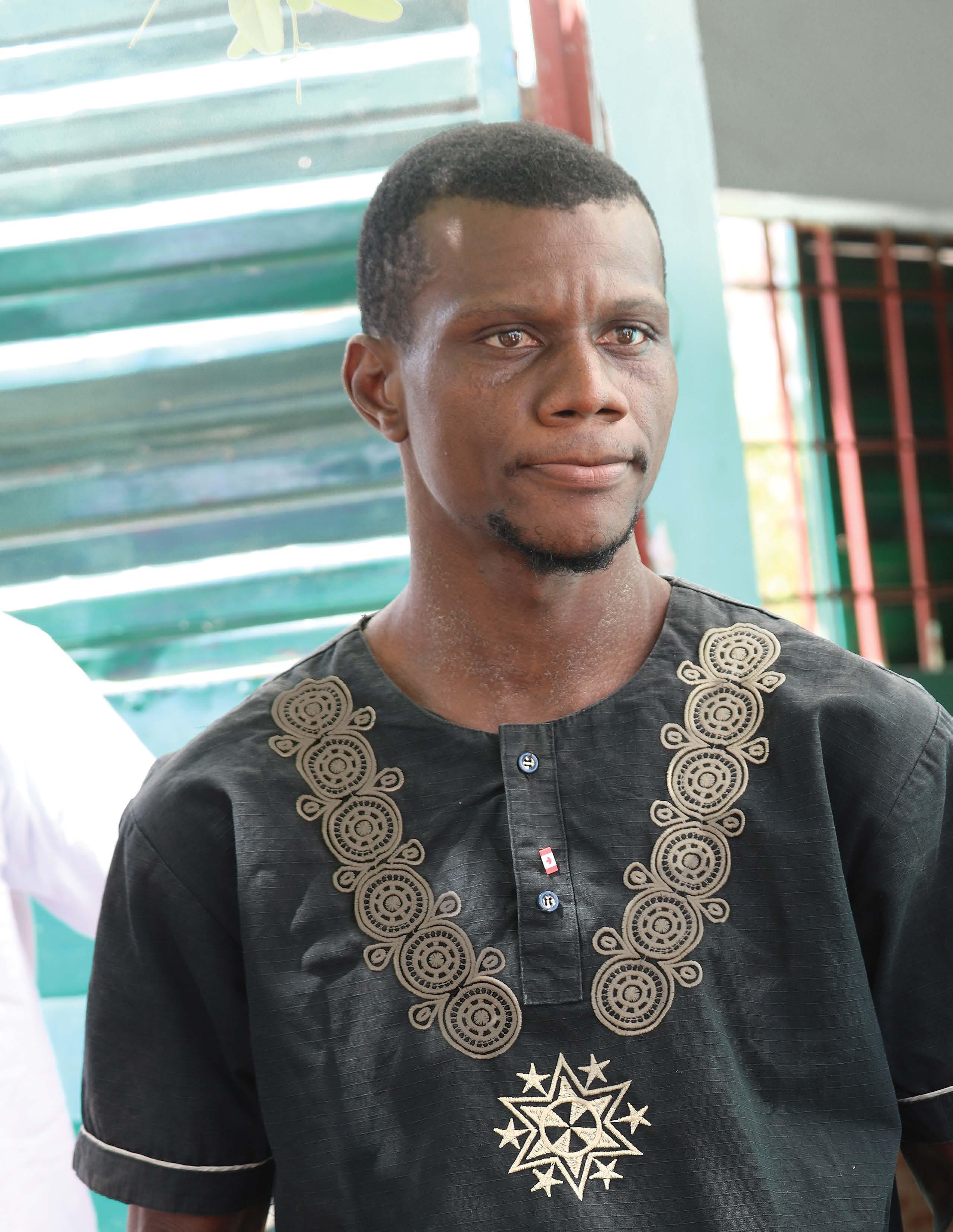 Where Christian faith gets down to business
Where Christian faith gets down to business
Changes to MEDA pitch competition mirror the organization’s evolution
People who attend MEDA’s pitch contest at the Toronto convention in November will notice some changes. Interestingly, those changes are completely in keeping with MEDA’s strategic direction.
A partnership with D-Prize puts the selection of finalists for the competition into the hands of an organization with considerable experience in running pitch competitions.
Like MEDA, D-Prize is greatly interested in providing support to organizations that can scale up in order to make lasting, systems-level changes in the Global South.
Since 2013, San Franciscobased D-Prize has provided venture capital support to more than 250 organizations. D-Prize’s biannual global competitions have granted startup support averaging $15,000 to one percent of applicants. About 15 percent of ventures receiving grants have grown to serve at least 100,000 people within their first five years or are on track to do so.

Like at last year’s MEDA contest, firms pitching in November will be people from the Global South promoting agri-food business ventures.
But the organizations invited to apply have already won initial seed funds from one of D-Prize’s global competitions. They have completed a pilot and are now seeking funding to sustain and scale their work.
As has been the case in the past, this year’s competition is funded by the Ron and Barb Schlegel family. The Schlegels donated funds to make the pitch competition possible
in honor of former MEDA president Allan Sauder.

The 2023 MEDA D-Prize Pitch Competition will take place at the Marriott Eaton Centre in Toronto on Saturday, November 4, between 9 and 10:30 am.
To learn more about D-Prize, visit https://d-prize.org/
Fruit and employment
Two of the main profiles in this issue touch on fruit and employment, although not in the same way.
Hamady Sow’s Vision Plus Afrique (story page 6) creates jobs for rural Senegalese women in collecting and processing the fruit of the baobab tree. He deliberately set up his business in a village where women are unable to find employment and hopes to expand to create jobs in other rural areas.
The 750 women who work for him also grow organic hibiscus, moringa (a fast-growing, drought-
resistant tree), tomatoes, and other vegetables. The baobab processing season lasts only three to four months, so the other crops provide continued employment.
At Shuh Orchards (story pg. 12) in rural southern Ontario, just north of Waterloo, the workforce challenge is completely different. There are many jobs for people to choose from, making manual farm labor unattractive.
The Shuhs rely on seasonal employees from Jamaica, who come to Canada every fall to pick apples. During a seven to eightweek harvest season, they can earn as much money as they could earn at home in an entire year.
Robert Shuh, who currently chairs the MiCrédito board and served nine years on MEDA’s international board, sees Canada’s Seasonal Agricultural Workers Program as being analogous to MEDA’s mission. .
2 The Marketplace September October 2023 Follow The Marketplace on Twitter @MarketplaceMEDA Roadside stand
Features
For a profitable harvest Partners of MEDA’s AVENIR project in Senegal show women farmers how to increase rice production.
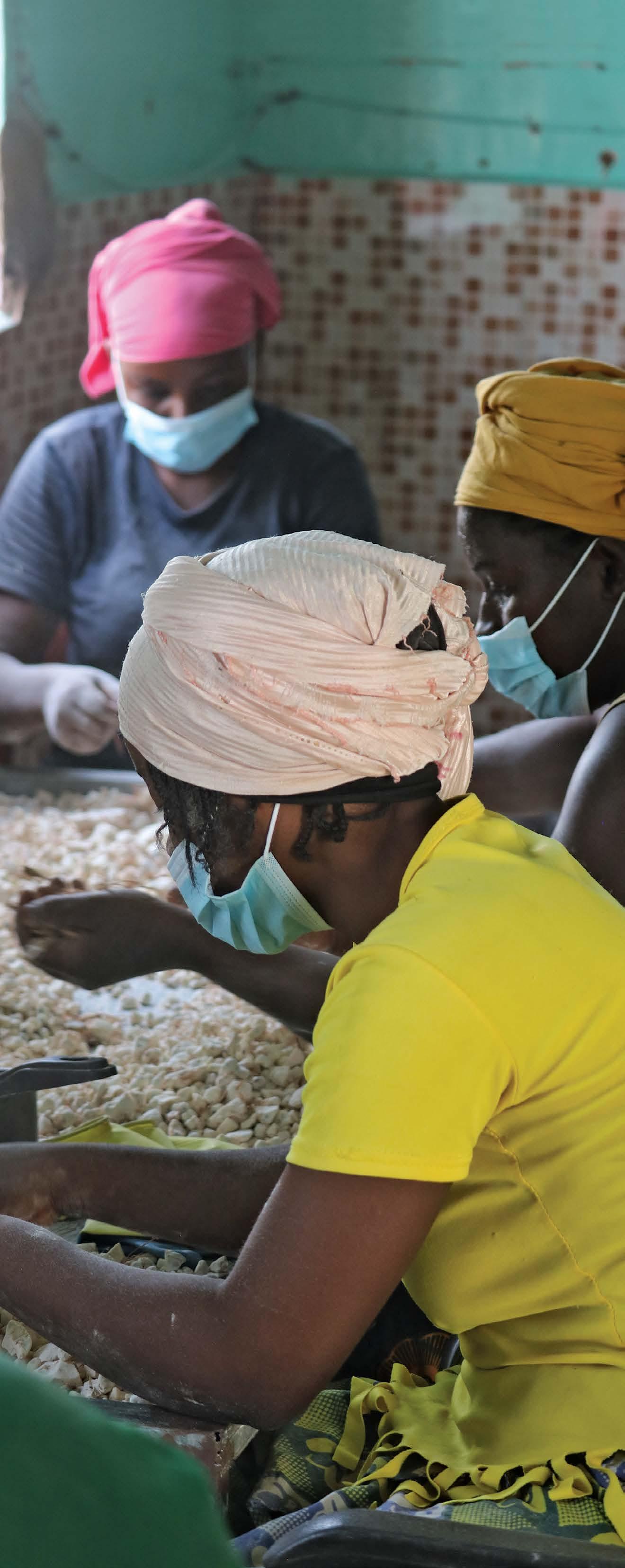
How do you like those apples?
Shuh Orchards feeds into the appetite for domestically grown fruit.
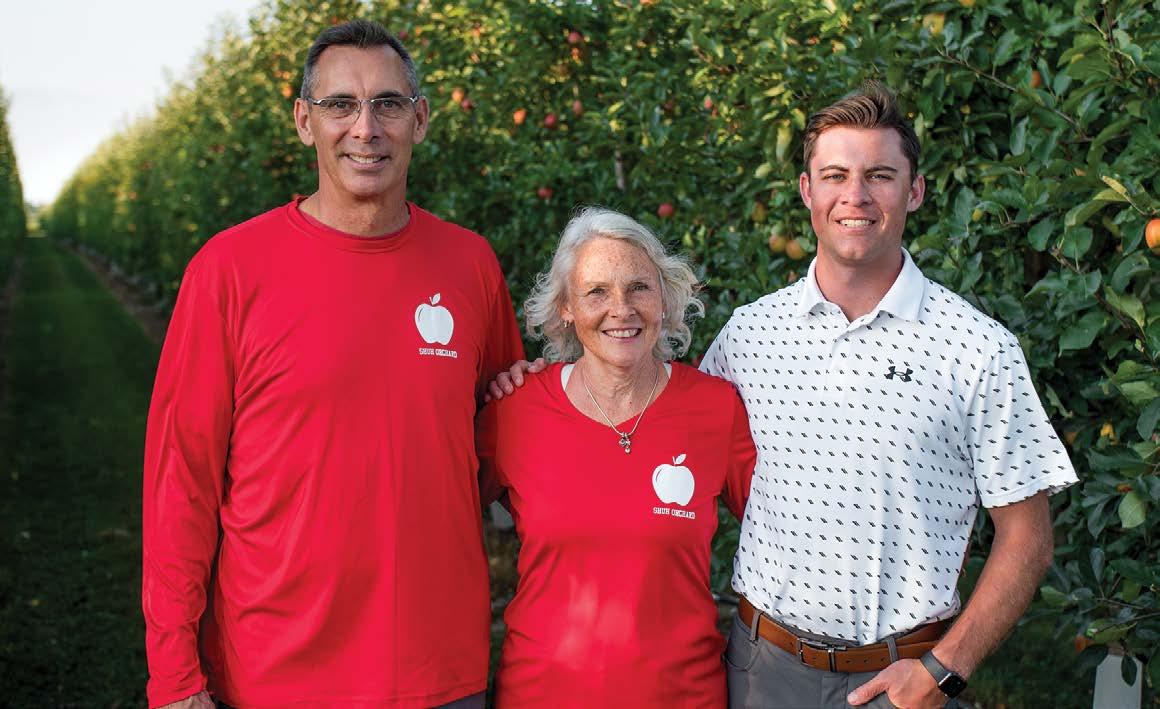
After the hurricane
A Florida dairy farmer reflects on a staggering loss and the people who helped him come out the other side. By Karen Whiting
Celebrating MEDA @ 70
Read about why you should plan to join us in Toronto in early November as MEDA looks back on 70 years of investing in entrepreneurs. It will be a convention that you won’t want to miss.
22 Roadside stand 24 Soul Enterprise 22 Books in brief 10
12 16 In this issue
Shorter good reads
20 3 The Marketplace September October 2023 6
Women in rural Senegal sort baobab fruit to remove impurities for Vision Plus Afrique.
photo by Mike Strathdee
Robert, Lisa, and Tim Shuh
Advertise and Price the Customer’s Outcome
This chapter, “Habit 8,” is excerpted from Darren Shearer’s new book, The ChristCentred Company: 37 Biblical Business Habits to Build a Thriving Company that Honors God and Blesses the World.
The book discusses real-world best practices and practical biblical commentary for all 37 “habits” surveyed in the accompanying Christ-Centred Company Assessment. That assessment enables firms to measure the extent to which their company culture and habits are consistent with biblical teaching.
The Christ-Centred Company is published by High Bridge Books.
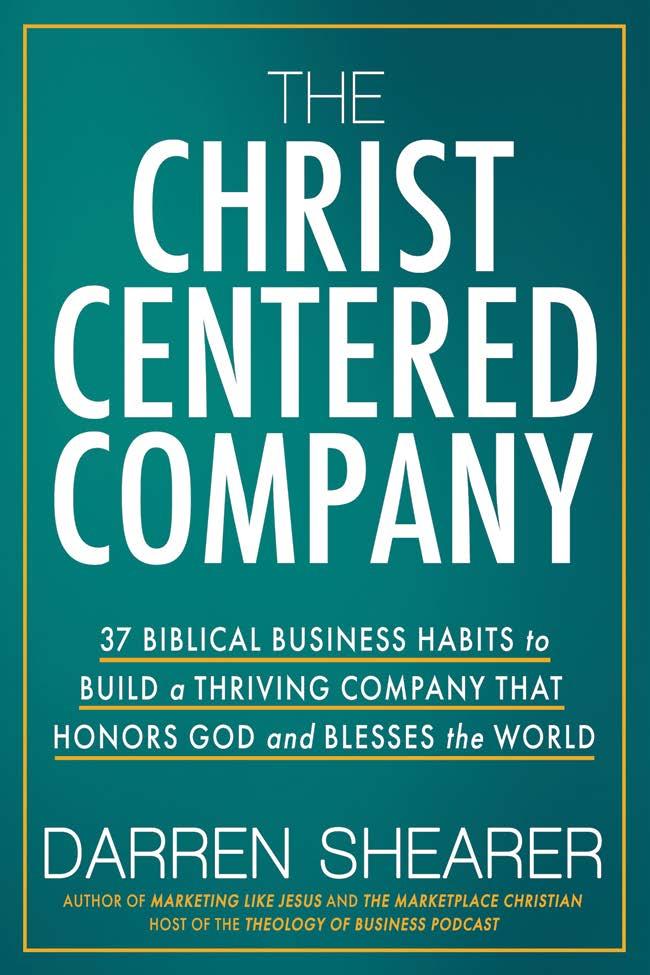
When John the Baptist was in prison, he was abysmally discouraged. John had been Jesus’ chief promoter, yet while languishing there in prison depressed, he started wondering if the whole Jesus thing was just a hoax. He wondered if his cousin, friend, and Lord was merely a wellintentioned charlatan. Had it all been for nothing?
Jesus didn’t send a message to John exhorting him to just keep the faith, rebuke the devil, and pray harder to cast out the doubt. Instead, here’s the message Jesus sent back to John:
Go and report to John what you hear and see. The blind receive sight and the lame walk. The lepers are cleansed. The deaf hear. The dead are raised. The poor have the Gospel preached to them. (Matt. 11:4)
Jesus responded with the results of what he had already accomplished rather than promises about things to come. Why did Jesus expect John not to lose heart and keep the faith? Because he gave him the proof that he had already delivered what he had promised. That’s what John needed to hear, and that’s what
people need to hear who might be skeptical about what your company is offering in the marketplace. Don’t advertise and charge people for an aspirational outcome you merely hope your customers will experience. In your marketing and advertising, help your team members gain confidence in what your company offers by emphasizing the results rather than making unproven claims. Advertise the real-world outcomes people have experienced from your products
and services. Your customers’ testimonials reveal and confirm the outcomes you’re truly delivering.
Ask your customers to share with others what you’ve done for them. After Jesus served people, he encouraged them to go and testify to others about what he had done for them — with a few exceptions. After delivering the man possessed by a demon at Gadara, Jesus told him, “Go home to your people and report to them what great things the Lord has done for you, and how He had mercy on you” (Mark 5:19). The Bible says, “He went away and began to proclaim in Decapolis what great things Jesus had done for him; and everyone was amazed” (Mark 5:20).
At the end of his time of service on Earth, Jesus told his disciples, “You shall be My witnesses both in Jerusalem, and in all Judea and Samaria, and even to the remotest part of the earth” (Acts 1:8). He commissioned them to testify to the world of everything they had seen, heard, and experienced with Jesus.
No story is more effective as a marketing tool than the testimony of a person who has benefited from your message, your product, your service, and your cause. Many people don’t buy anything without first scanning the ratings and reviews for the products or services they are considering. Observing the social proof of five-star ratings and positive reviews often makes the difference in determining which product or service to buy.
4 The Marketplace September October 2023
Soul Enterprise
We advertise and price our products and services based on the positive outcomes our customers say they experience from them, and we encourage our customers to share those positive outcomes with others
However, many people won’t share testimonies about you unless you ask them personally. Some people may feel they need to have your permission to talk about you and your company publicly. Go ahead and deputize them as part of your word-ofmouth marketing team. Aim to get a testimonial endorsement from the people who have already benefitted and are currently benefitting from what you’re offering. Here’s a portion of text we send out to our author clients periodically: We’re looking to get some fresh testimonials to share with prospective authors who are
Worth Pondering
considering publishing through High Bridge Books. Would you be willing to send us 1-3 sentences (or more) to explain to someone why they should consider working with us? Be aggressive about getting feedback on how your product, service, cause, or message is changing lives. Archive this feedback carefully and share your positive reviews and testimonies with others.
Reflection, Discussion, and Application
Who are the people you need to ask for a written or video
“When you harvest your land’s produce, you must not harvest all the way to the edge of your field; and don’t gather every remaining bit of your harvest. Leave these items for the poor and the immigrant; I am the Lord your God.” — Leviticus 23:22 (CEB)
“Each of us has the power to contribute to a problem or to be part of the solution.” — Ryan Holiday
testimonial of how your company has improved their lives? What will you say to them to invite their feedback? .
Darren Shearer is the founder and director of the Theology of Business Institute, which helps marketplace Christians explore and apply God’s will for business. He is the host of the Theology of Business podcast and Houston Christian University’s Christianity in Business podcast.
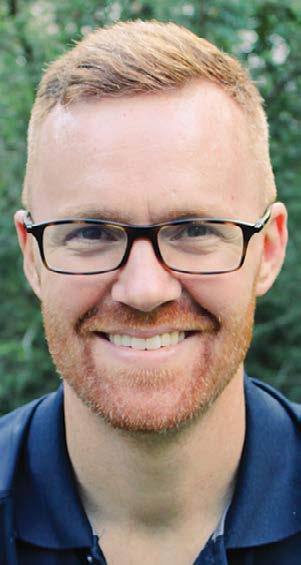
Shearer has authored five books, including Marketing Like Jesus: 25 Strategies to Change the World and The Marketplace Christian: A Practical Guide to Using Your Spiritual Gifts in Business
He is also the founder and CEO of High Bridge Books & Media, a multimedia agency specializing in publishing and promoting the world-changing ideas of Christ-centered influencers.
Volume 53, Issue 5
September October 2023
The Marketplace (ISSN 0199-7130) is published bi-monthly by Mennonite Economic Development Associates at 532 North Oliver Road, Newton, KS 67114. Periodicals postage paid at Newton, KS 67114. Lithographed in U.S.A. Copyright 2023 by MEDA.
Editor: Mike Strathdee
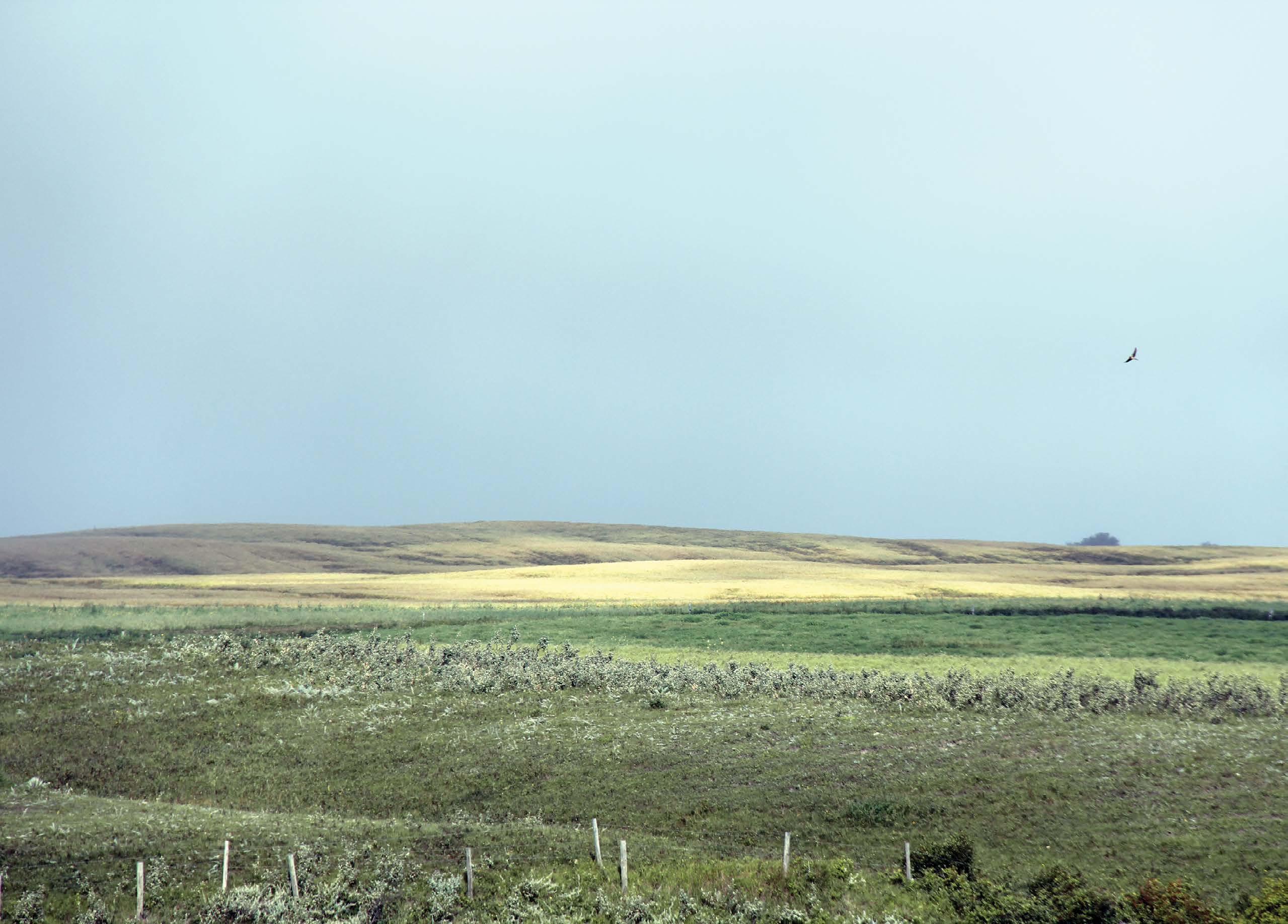
Design: Ray Dirks
Postmaster: Send address changes to The Marketplace 33 N Market St., Suite 400, Lancaster, PA 17603-3805
Change of address should be sent to Mennonite Economic Development Associates, 33 N Market St., Suite 400, Lancaster, PA 17603-3805.
To e-mail an address change, subscription request or anything else relating to delivery of the magazine, please contact subscription@meda.org
For story ideas, comments or other editorial matters, email mstrathdee@meda.org or call (800) 665-7026, ext. 705.
Subscriptions: $35/year; $55/two years. Published by Mennonite Economic Development Associates (MEDA). MEDA’s economic development work in the Global South creates business solutions to poverty. MEDA also facilitates the connection of faith and work through discussions, publications and conventions for participants.
For more information about MEDA call 1-800-665-7026. Web site www.meda.org
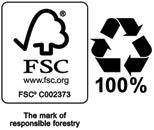
Want to see back issues or reread older articles? Visit https://www.meda.org/download-issues/

The Marketplace is printed on Rolland Enviro® Satin and is made with 100% post-consumer sustainable fiber content, FSC® Certified to help meet client sustainability requirements, Acid Free, Elemental Chlorine Free
Cover photo of Hamady Sow by Mike Strathdee
Darren Shearer
“Overcoming poverty is not a gesture of charity. It is the protection of a fundamental human right, the right to dignity and a decent life.” — Nelson Mandela
5 The Marketplace September October 2023
Building a baobab business
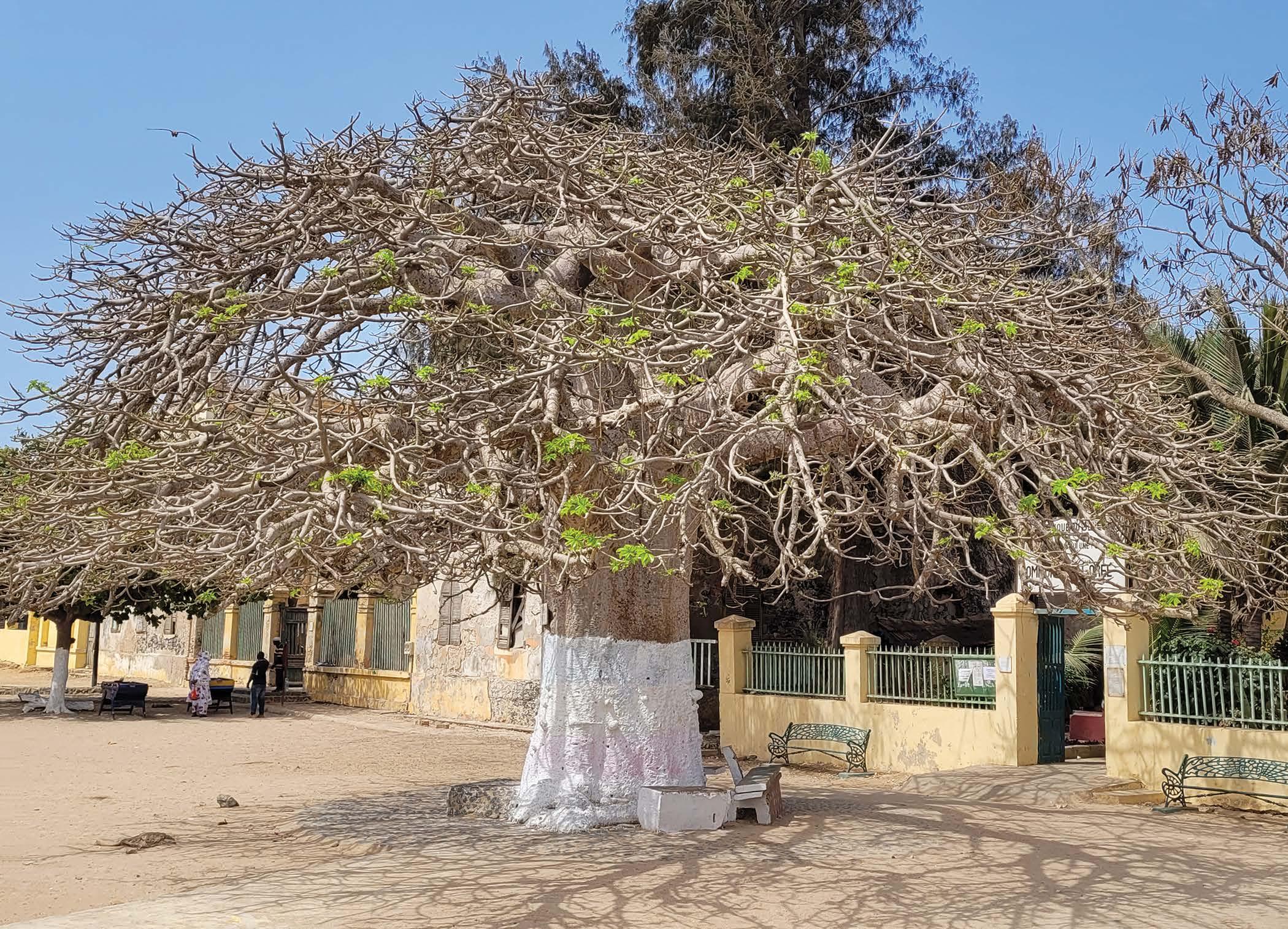
Senegalese entrepreneur creates rural jobs in collecting and processing exotic fruit.
When Hamady Sow settled in Bala, a town in eastern Senegal’s Tambacounda region, he noticed that many youths leave the country after finishing their studies.
One reason for that exodus was the lack of agriculture and foodprocessing businesses.
Sow decided there is much to be done to create jobs in the region. In 2009, he created a company, Vision Plus Afrique (Vision Plus
Africa), while still studying. Vision Plus Afrique works with 750 people in 10 co-operatives, most of whom are women who live in far-away villages with no employment access.
Sow organized groups of women in each village to collect baobab fruit and bring it to his factory. That allows him to create employment and add value to the baobab fruit.
The fruit is also called monkey bread, as monkeys like to eat it. Women collect one million bags of fruit during harvest season in the month of January. They knock the fruit off the trees with sticks, break it, and put it into the bags.
Workers at the factory in Bala do a second sorting to cut the fruit. The fibers and nuts are removed from the pulp.
Every aspect of the fruit is
6 The Marketplace September October 2023
Photos by Mike Strathdee
The baobab tree produces fruit that has a variety of culinary uses.
used. A machine then grinds the white pulp into a fine powder, the nuts are used to make skin moisturizing oil, and the fibers are used for fertilizer.
Baobab powder has a variety of culinary uses. High in vitamins C and A, it is also said to be a good source of iron, magnesium, and antioxidants. It is mixed into sauces, salad dressings, yogurt, jams, and jellies as an added flavoring.
The ground pulp can also be stirred into soups and stews, added to porridges or baby food, or sprinkled as a topping over popcorn.
In Senegal, Baobab fruit is used in bouye juice, a drink made from the fruits, or bissap, a drink of Baobab powder combined with dried hibiscus flowers, ginger, sugar, and water.
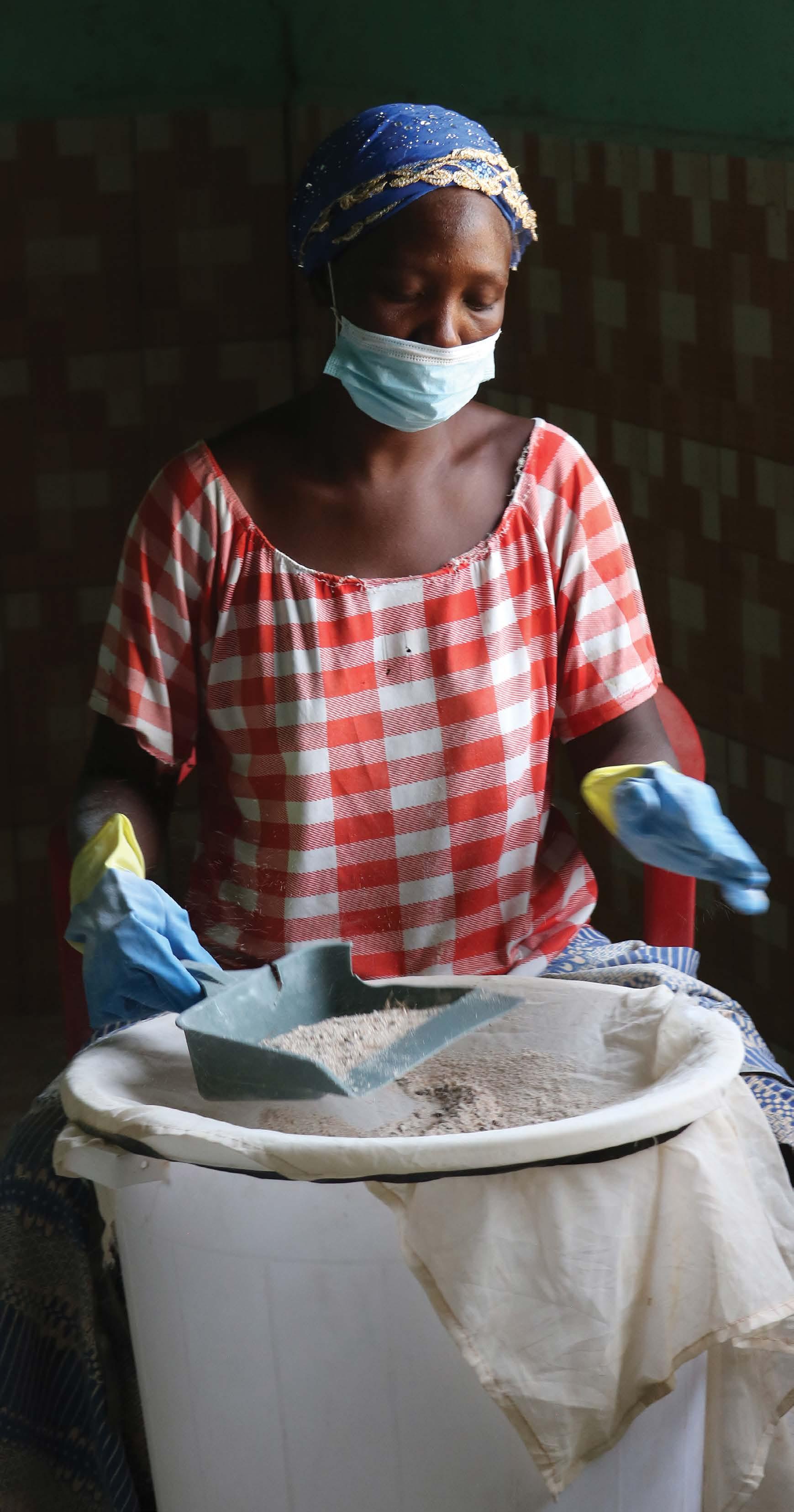
Many baobab trees produce fruit after 25 years, but research has found that some trees can start producing after seven years. Research to be conducted as part of MEDA’s AVENIR project will work at domesticating the baobab tree and having it produce fruit earlier by intercropping it with other crops.
Sixty percent of the company’s production is exported to Europe, where it is sold in various supermarkets. During the most recent season, it processed 1,000 tons of baobab.
Sow has grown the company without any outside financial assistance. But he
The Marketplace September October 2023
7
Crushed baobab fruit is poured through a cloth sieve before being bagged.
realized that he could only get so far on his own.
In September 2022, he learned of MEDA’s AVENIR project. Experna, a Senegalese agriculture co-op, introduced him to MEDA.
He submitted a proposal for a matching grant from MEDA and was approved for financial support.“His company was selected because it operates in one of the value chains of the AVENIR project: the baobab fruit,” said Fansou Baji, MEDA’s smart incentives specialist for the AVENIR project.
“In addition, it is a company run by a young person.”
New equipment worth over $42,000 USD, subsidized by MEDA, was expected to be operational this summer.
Installing the new equipment allows Vision Plus Afrique to accelerate the processing of agricultural products and oils, Baji said. Part of these products will be sold raw. Other parts will be transformed in the production unit before being placed on the market.
MEDA’s support will enable Vision Plus Afrique to work fulltime and to supply the supermarkets with pancake mix, baobab syrup, baobab jam, baobab oil, baobab
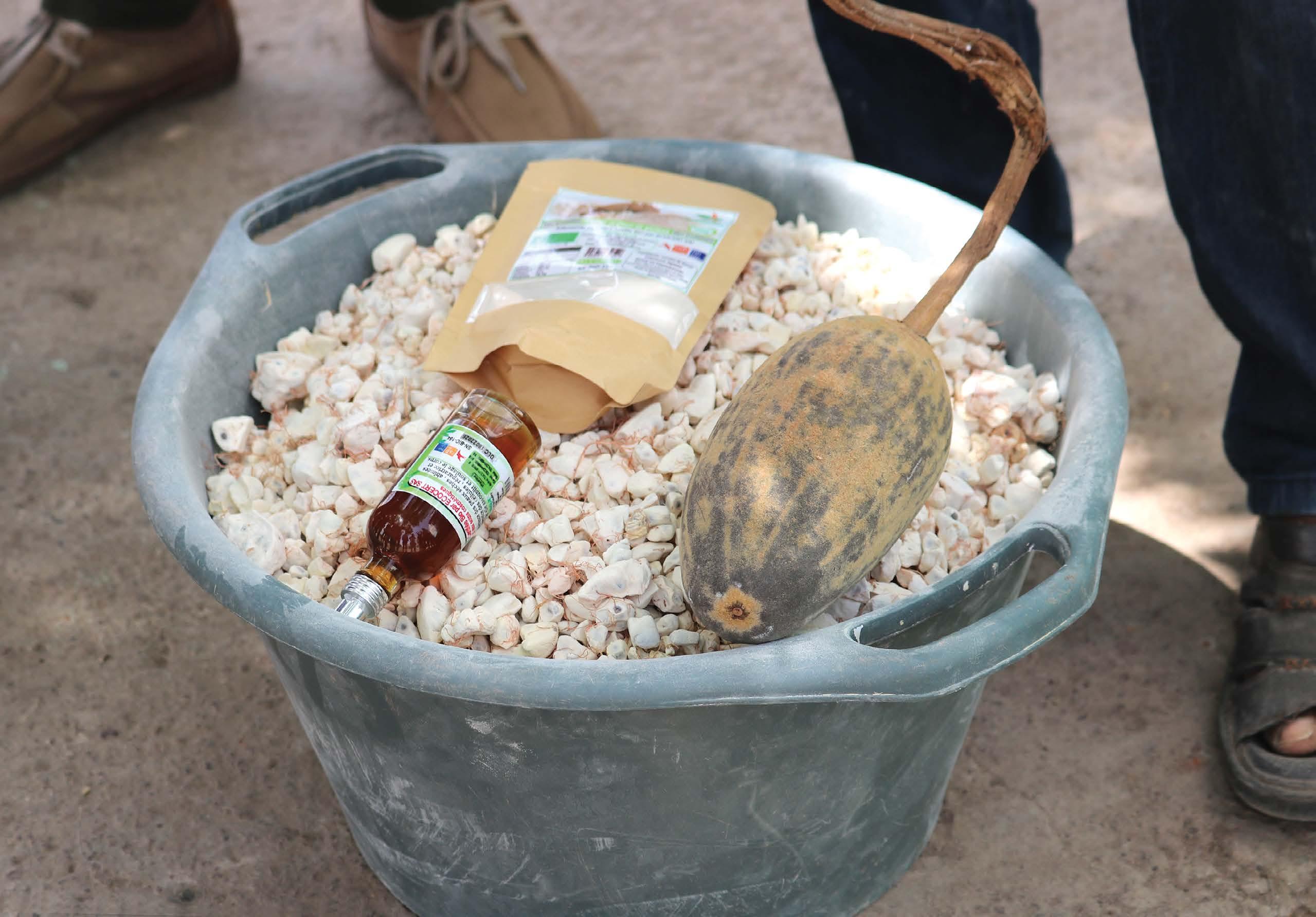
powder, juice, and other products.
The partnership with MEDA is the first time anyone has offered to invest in Sow’s firm.
Sow would like to purchase more solar panels to power his machinery because electricity fees are unaffordable. Some of his existing panels are working at 60 percent capacity as he doesn’t have all of the required equipment.
Further harnessing solar power would also allow him to diversify his business, producing baby food and mixes with hibiscus and other juices.
He sees a market in providing
8 The Marketplace September October 2023
The pulp from baobab fruit is used to make powder, oil and other products.
baby food fortified with baobab powder in order to strengthen malnourished or anemic children. Adding that line would also allow him to hire more people from the community.
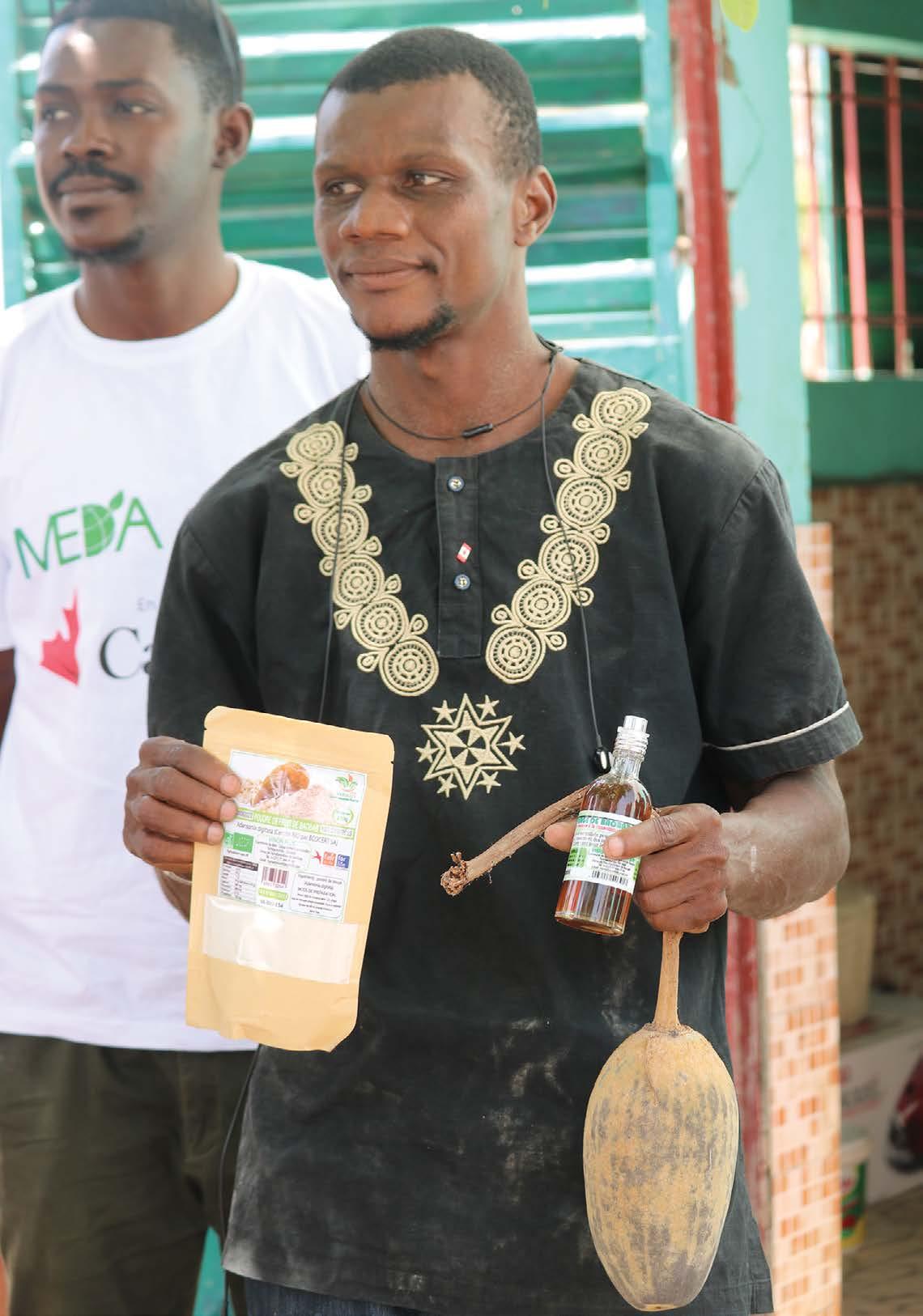
The company currently employs 35 and receives fruit from 750. By expanding production to other villages, Sow hopes to more than double the number of workers.
For the time being, he has no competition in his market niche in this region.
Each group of women who work for him also grows organic hibiscus, moringa (a fast-growing, drought-resistant tree), tomatoes, and other vegetables on 200 hectares (just over 424 acres) of farmland. The baobab processing season lasts only three to four months, so the other crops provide continued employment.
During the rainy season in June, his firm plows the land and
uses 459-foot-deep boreholes to access water for these crops.
Senegal receives a lot of sun. Solarpowered pumps allow the firm to access water for crops from seven in the morning on.
Sow decided to focus on organic production because of environmental issues, the changing climate, and concerns about diseases caused by some chemicals.
A distribution center in Dakar repackages the company’s products for sale. It employs 20 women and five men. .
Hamady Sow holds products made from baobab fruit.
Facts about the AVENIR project
MEDA has been active in Senegal since 2019. Its current project, AVENIR, runs until June 2026.
AVENIR is a French word that means future. For MEDA, it is an acronym that stands for Adaptation and Valorization of Entrepreneurship in Irrigated Agriculture in English.
The $19 million project is funded by $18 million from Global Affairs Canada and $1 million from MEDA and the International Centre for Tropical Agriculture (CIAT).
The project aims to improve farming households’ socio-economic wellbeing and resilience in Senegal’s Tambacounda and Sedhiou regions.
The project focuses on directly benefiting 11,500 women and youth, including creating decent work for 6,941 individuals.
The project focuses on four agricultural value chains. These are: cashew, mango, baobab and rice.
Senegal’s population is 18.1 million people. Its population is young, with a median age of 18.5 years. Over half the population is rural. The World Bank estimated that about 36.3 percent of the population lived in poverty in 2022, earning less than $3.65 US (just over 2.209 Senegalese francs) a day.
While Senegal is one of Africa’s most politically stable nations, it is vulnerable to environmental shocks. Droughts and floods are expected to increase in scale and duration due to increased climate variability.

These challenges place added burdens on small farms, which already struggle with land overuse, a shorter rainy season, and soil degradation challenges.
Small-scale farmers in Senegal have limited knowledge of climatesmart agriculture and irrigation practices. They often have little access to improved inputs, technology, and land. These challenges make it difficult for women and youth to make profits from their labor. .
SENEGAL
Tambacounda
9
The Marketplace September October 2023
Dakar
Bala
A demonstration project being operated by MEDA partners in Senegal’s Sedhiou region is working to show women farmers the importance of growing rice in irrigated rows.

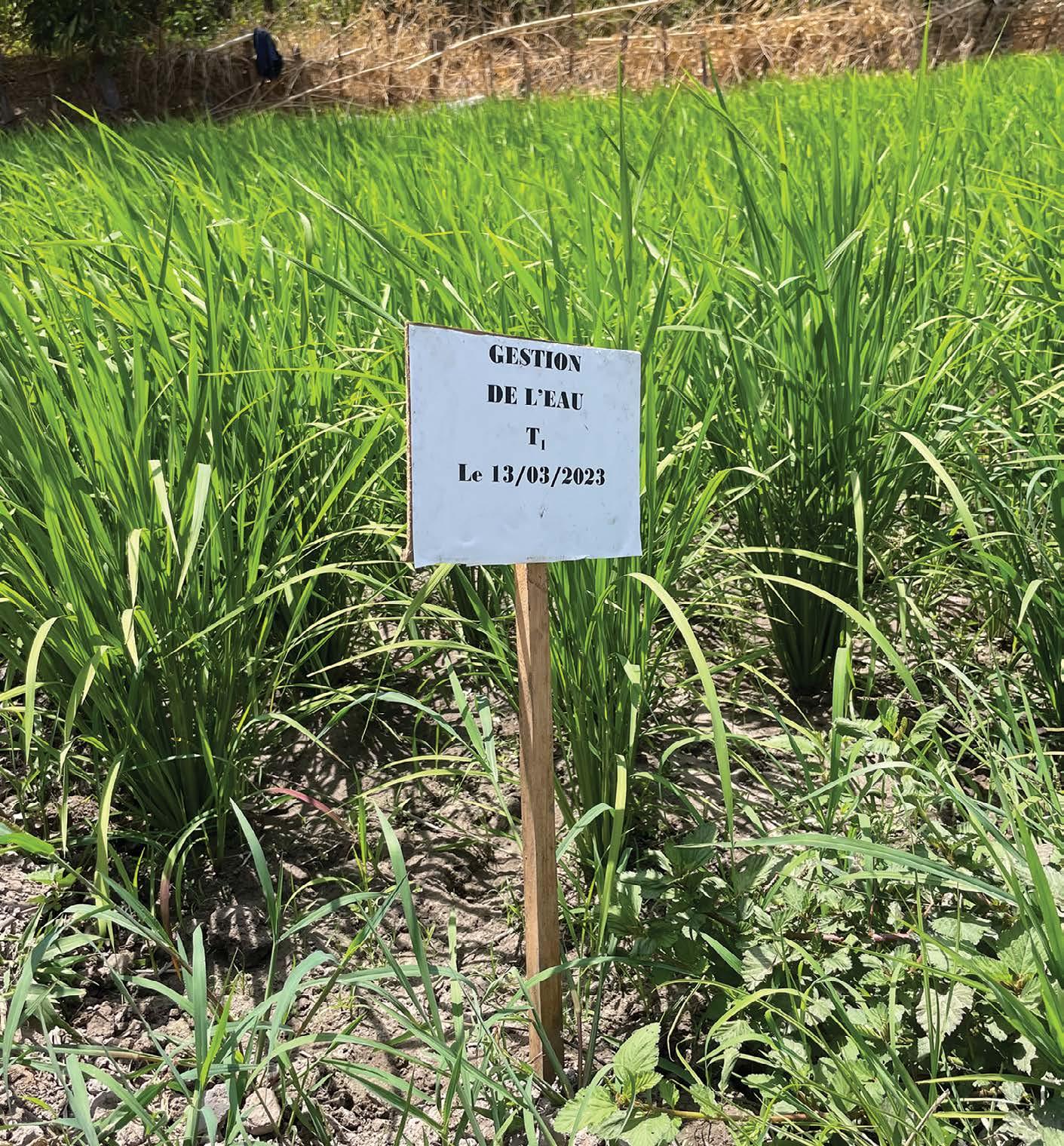
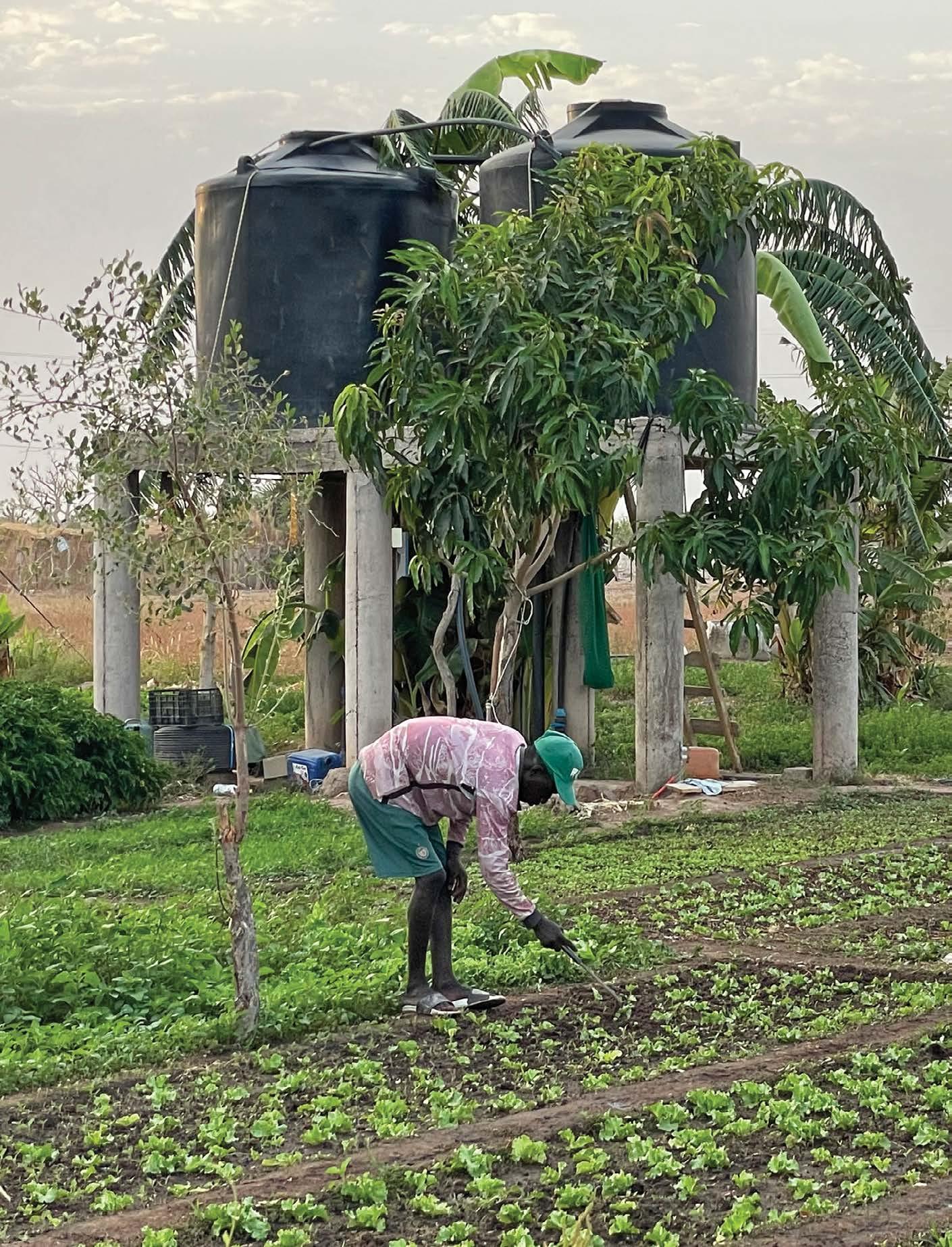
MEDA partners Ancar and AFEX are also showing women from the KAKATA agricultural cooperative how combining these efforts with using compost to nourish the rice crop can make their work commercially viable.
The first photo (clockwise from top left) shows an irrigated test plot. The second photo shows the contrast between the test plot and the much lower yield from a plot sowed and grown in a traditional, non-irrigated fashion.
Rice farming is part of Senegalese culture, passed down from generation to generation, visitors to the demonstration project were told.
Traditional practices, including women using hand hoes to plow the land, are not sustainable. While women farmers from an area co-operative greeted visitors with big smiles, their faces became solemn as they described their challenges. In some cases, their harvest has not been much larger than the amount of seeds sown.
The co-operative’s president (not pictured) spoke of the group’s desire to displace imported rice and attain self-sufficiency, growing enough rice to feed the surrounding area and even other parts of Africa.
A 2016 study showed that only onethird of rice consumed in Senegal is grown domestically, with about 700,000 tons imported annually. Much of the farmland available to the co-op is not being used, however, due to a lack of access to water.
The rainy season is short and unpredictable. A lack of water hampers the cultivation of vegetables as wells dry up, several women said.
In other areas, some low-lying land has become salty since the 1970s. That has led to dikes being built to keep out saltwater.
A horticultural project in the Tambacounda region shows the difference that irrigation can make, even in a hot and arid climate. A five-hectare plot of greens is nourished with water pumped from a borehole and stored in the tanks at the top left of the photo. MEDA’s partners alongside this men’s and women’s cooperative are CIAT International Center for Tropical Agriculture and ISRA, the Senegalese Agriculture Research Institute. .
The Marketplace September October 2023
10
Photos by Mike Strathdee and Randy Sawatzky, MEDA
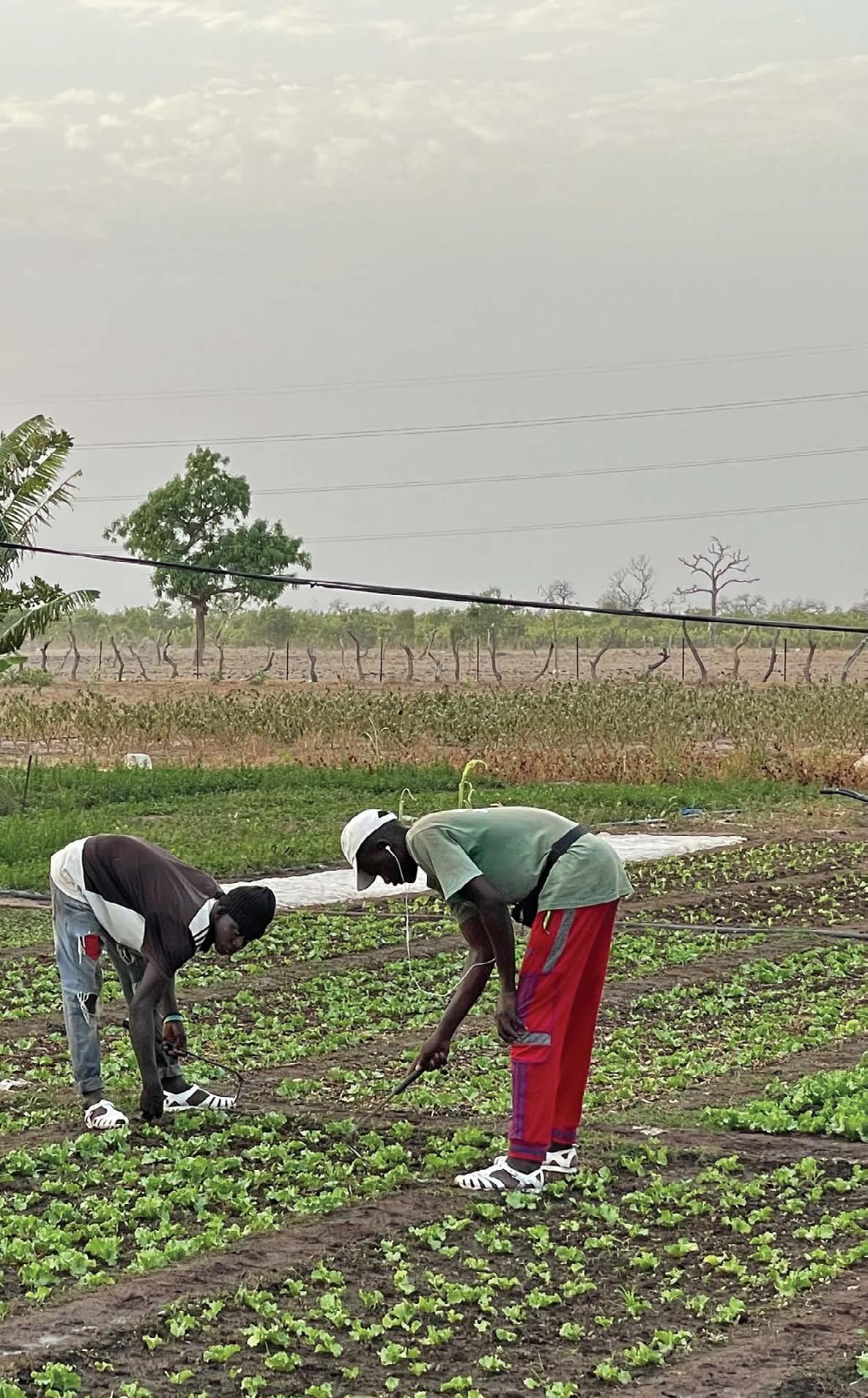
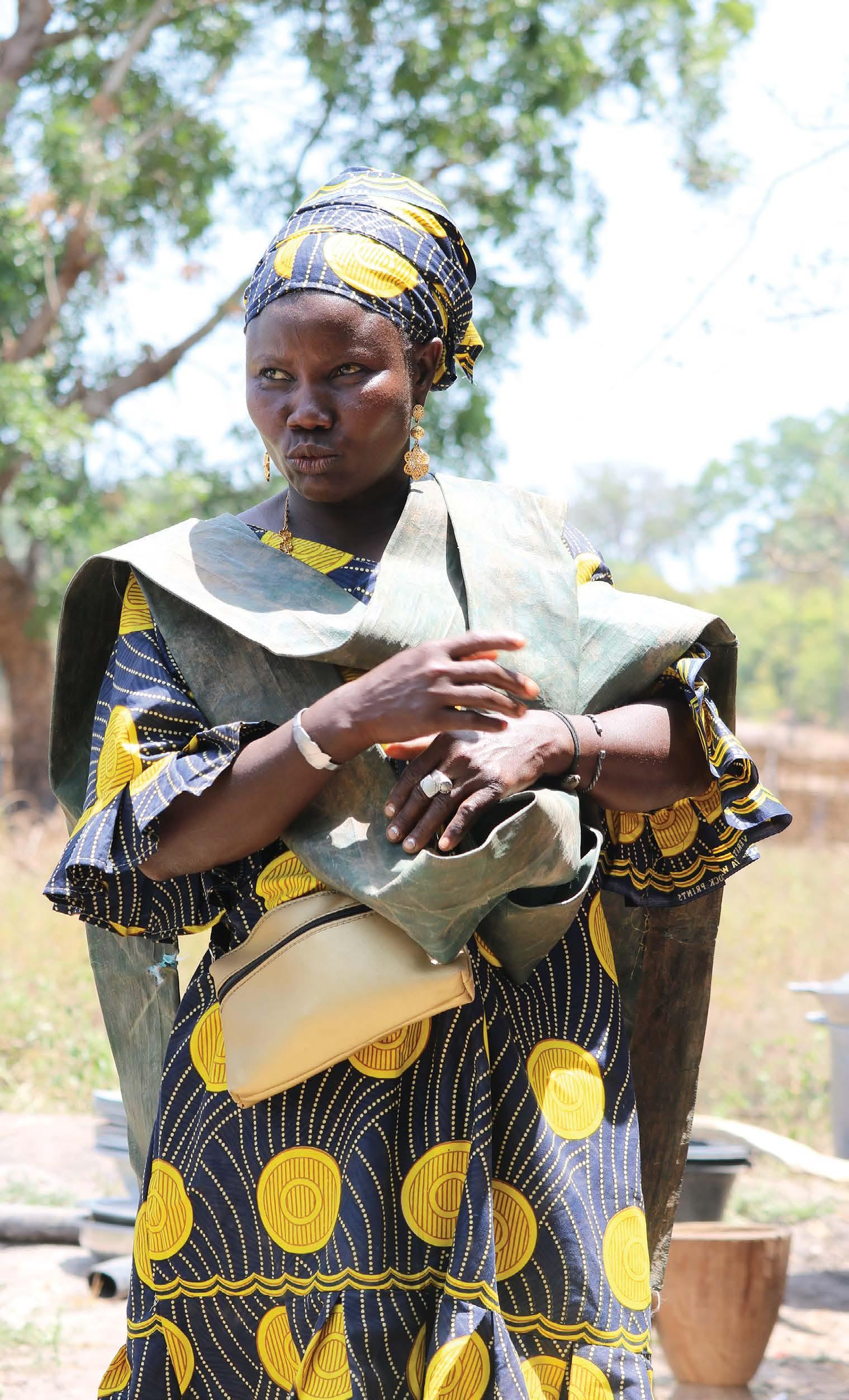
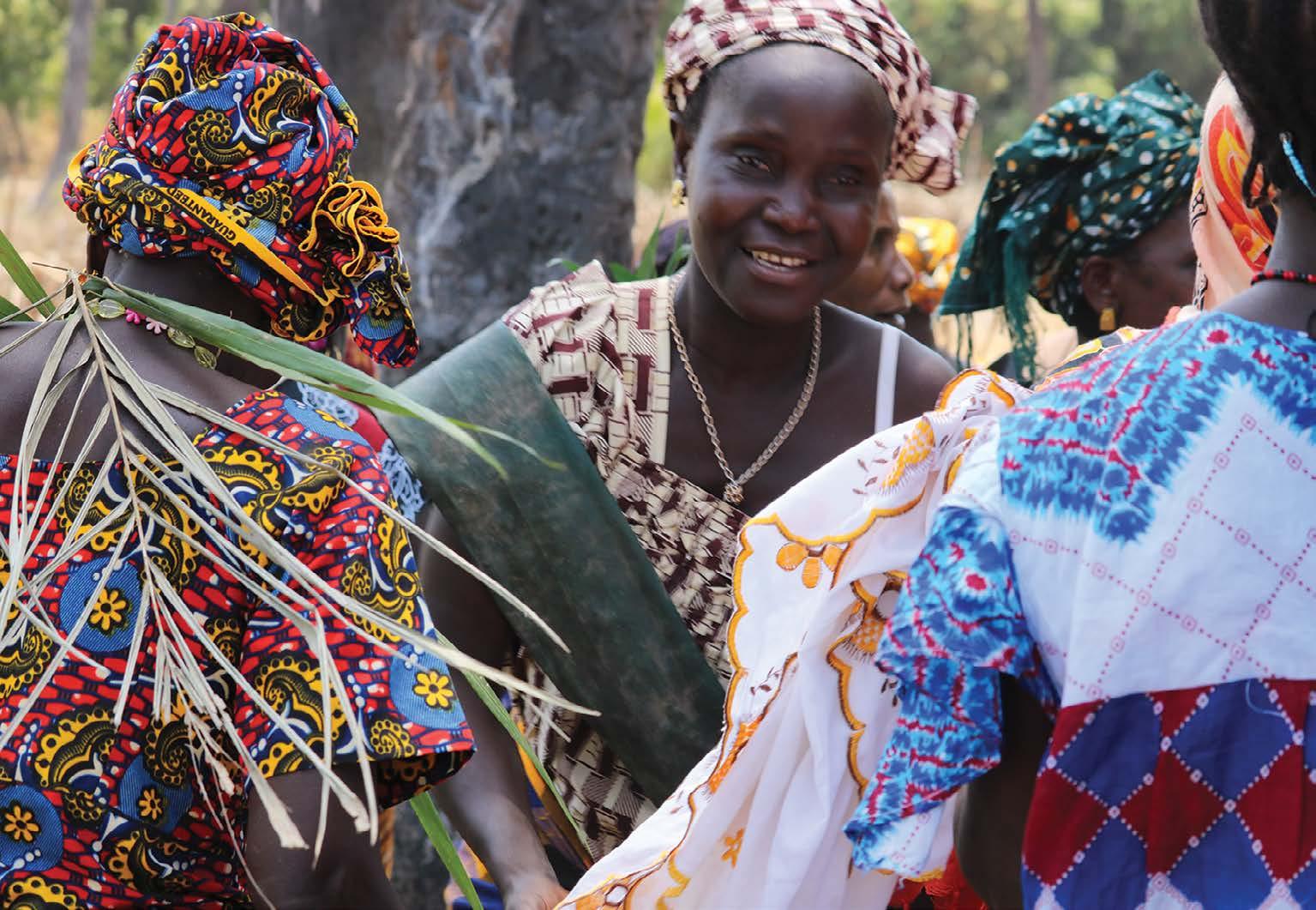

11 The Marketplace September October 2023
The photo above shows the contrast between a rice paddy sown using traditional methods, and a test plot that is irrigated, sown in rows and fed with compost.
Picking a profitable line of farming
Shuh Orchards feeds into growing market for Ontario apples
During Robert Shuh’s farming career, he has pretty much worked his way around the barnyard.
Over the years, Shuh and his wife, Lisa, have been involved in dairy, turkey, chickens, cash cropping, and working with sesame as part of a MEDA project in Nicaragua.
“I’m not somebody who’s afraid to make changes,” he said during a tour of his latest passion, Shuh Orchards, a 50-acre apple orchard near West Montrose, Ontario.
“For those people who don’t understand being wired the way I am, they think I have a severe problem with commitment or stickto-it-ness. But I’m always excited about what else is out there.”
In a speech to the Waterloo MEDA Hub this spring, the 61-year-old spoke of entrepreneurs understanding that “every once in
a while, it’s just time for a change. You’ve taken the last project, you’ve built it up, so again, it’s time for something new.”
“In 2011, that’s where we were. We spent a year doing research.”
Shuh knew little about apple farming when he began that research. Yet there was family history in that venture.
“Interestingly enough, there was an apple orchard on the (home) farm.”
His grandfather, Clarence, planted a three-acre orchard at a farm just outside of Elmira in the 1920s. Robert’s brother, Bruce, sold apples at the Kitchener Market with their father, Howard, on Saturday mornings in the 1960s.
Those trees were 50 feet apart. The current practice is to plant trellised trees three feet apart.
The earlier Shuh orchard had
10 trees per acre; the newer orchard has 1,260 trees in the same space.
A chance conversation with another father while watching his son play hockey led Robert Shuh into the apple business. He was speaking to someone who worked for Martin’s Family Fruit Farm and told that person about his journey. “He turned to me and said: Robert, you should grow apples.”
That led him to a series of conversations with the company’s president, Kevin Martin, and a decision to enter the business.
Martin’s is a family-owned operation. The company’s website says it “has grown into one of the country’s largest apple growers, packers and processors,” with more than half a million trees on over 700 acres.
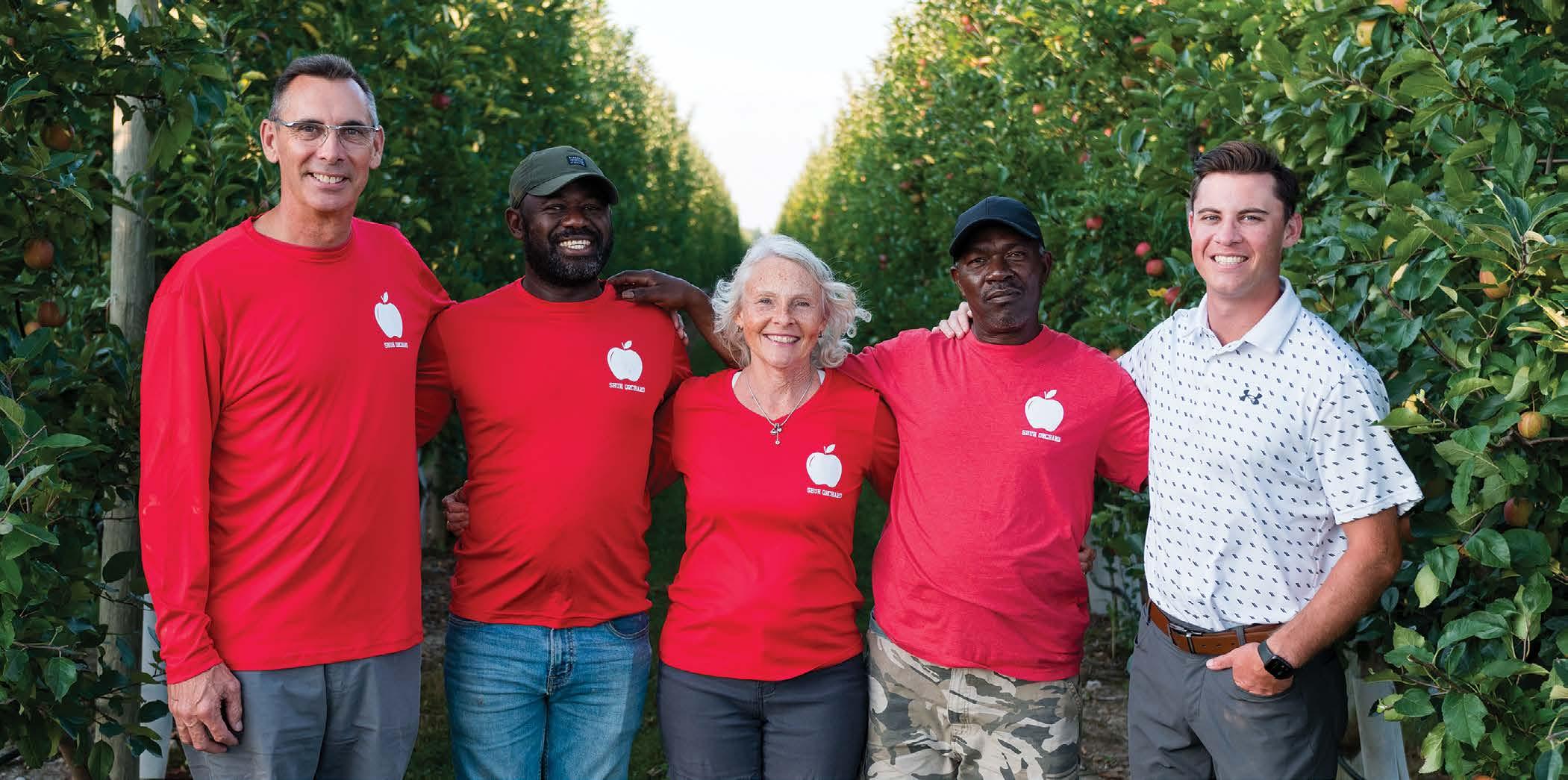
12 The Marketplace September October 2023
Photos by Bird Media Co.
Its farms are on the north side
Robert Shuh, Dave Brown, Lisa Shuh, Leroy Martin, and Tim Shuh stand between rows of apple trees at Shuh Orchards.
of Waterloo, Ontario and on the north shore of Lake Erie near Port Burwell, nearly two hours south of Waterloo.
Robert and his wife, Lisa, chose to partner with Martin’s due to the reality that to get into the retail market, a grower needs to have multiple orchards to be able to supply year-round. “The Martins have been an outstanding partner with us in the supply chain,” Robert said. “We could not ask for a better relationship there.”
Almost all of the Honey Crisp, Gala, and Ambrosia apples they grow are marketed by Martin’s. The Shuhs’ son, Tim, oversees a laneway fruit stand business that sells about one percent of annual production.
Growing apples can be a lucrative business. Shuh Orchards produces north of $1 million in value annually on 50 acres, significantly above what growing corn, wheat, or soybeans could produce, Robert Shuh said.
Apple acreage in Ontario has increased dramatically in recent years. About 38 percent of apple tree acreage in the province was planted less than 10 years ago, the Ontario Apple Growers’ 2022 annual report said.
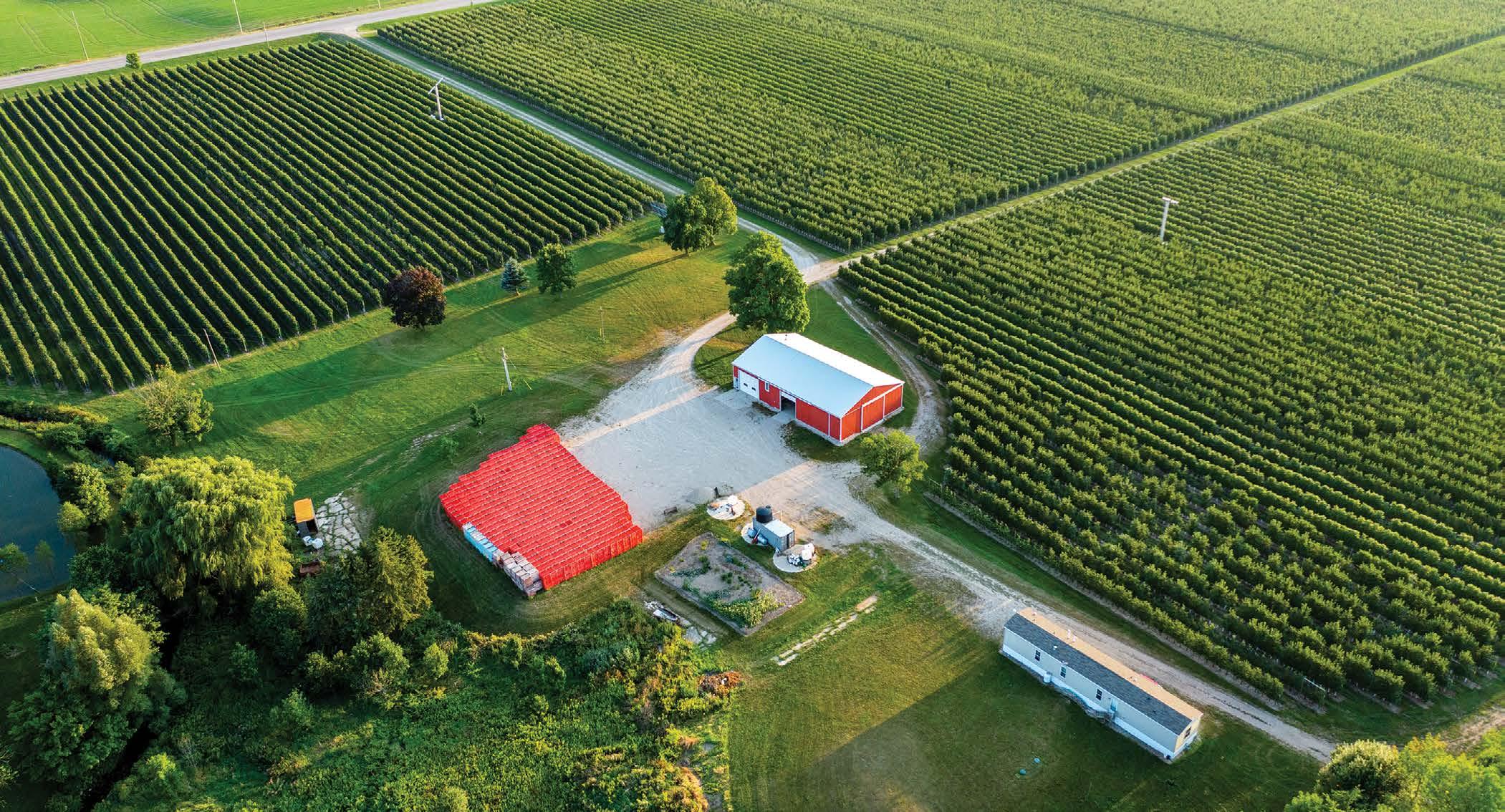
About half of the apples consumed in Ontario are imported.
Like many farming endeavors, Shuh Orchards experienced its share of growing pains and challenges.
In 2013, family and friends helped them to install all of the irrigation and most of the apple trees on the property.
But when fall came, and students returned to school, the work was incomplete. The Shuhs felt some panic, but then the phone rang.
The leader of a Conservative Mennonite youth group that was planning to do a missions trip to Nicaragua wanted to know if the Shuhs had any work that needed to be done. They were looking to raise money for their trip.
The remaining task, putting white paint at the base of each tree, was “back-breaking work,” Robert recalled.
(White paint reflects light away from trees to prevent winter damage.)
That experience helped the Shuhs realize they needed a committed, skilled staff to work at their orchard.
So they became involved with Canada’s Seasonal Agricultural Workers program, hiring Jamaican laborers every year. “That was absolutely the best decision that we
could ever have made,” Lisa said.
Extreme weather provided the next challenge.
In December 2013, a major ice storm hit. The weather changes within a day or two in most cases with Canadian ice storms. “But it turned cold, and the ice remained on the trees for two weeks,” Robert said.
Many trees cracked, “and we started wondering what have we done? It could be a disaster from which there’s no coming back.”
Problems mounted when the ensuing winter became the coldest of the Shuhs’ lifetime, with several days of temperatures below minus 22 Fahrenheit (minus 30 Celsius). He said that mature trees can handle that fine, but young trees are less able. “Again, what can be done? Anxiety.”
Those trees came to life in the spring of 2014, and they thought all was well. When their agronomist visited and started cutting trees off, Robert was shocked.
After cross-sections were taken to a lab, they were told to cut off 36,000 Gala apple trees at the knees. “It was horrible.”
Another 1,800 trees that they didn’t cut off developed black rot, a fungal disease.
13 The Marketplace September October 2023
Aerial view of Shuh Orchards, just outside of West Montrose, Ontario
The situation reminded him of Wally Kroeker, the former editor of The Marketplace magazine, who once described farmers as being God’s junior partner in creation.
“God didn’t need help to do this whole creation thing, but the trees don’t grow in the rows, and be grafted and all that, without the help of humans. And so, we clung to the hope that there is tremendous resilience in God’s creation.”
“A few weeks later, new shoots came up, and we were back in business again.”
The Shuhs’ first harvest was in the fall of 2016. “It was not a large crop at all, but it was enough to cover the annual costs of operation of the orchard.”
2020 was a difficult year for the Shuh orchard operation, as it was for many others, Lisa said.
One of her tasks was to process all the emails from various levels of government and public health and try to keep up with rules around what they should be doing.
When they arrived from Jamaica, their seasonal workers had to quarantine and do daily health checks. “It was challenging,” she said.
The pandemic spotlighted the living conditions of seasonal agricultural workers, with many media reports that workers were forced to live in sub-standard housing. “That was really not the truth at all,” she said.
“We had our workers in housing that was completely adequate.”
Partly in response to these perceptions, the Shuhs built dedicated bunkhouses for their workers, to provide more capacity
Orchard owners support gleaning, care for seasonal workers
Not every apple grown in a commercial orchard gets picked.
Some apples are too small or the wrong shape to be picked. A few may get missed, hidden from view.
Others fall to the grown and cannot be recovered for sale due to health regulations, even when the fruit is unblemished.
Lisa Shuh decided that Shuh Orchards should practice the biblical concept of gleaning, allowing newcomers in the community to get some apples.
She volunteers for an organization that works with refugee claimants and decided to host a gleaning day for some of these people.
The practice began in 2017, the first year the orchard produced a decent crop, she said.
Gleaning day attracted 30 or 40 people that year and then grew to 50 and 60.
The Shuhs couldn’t let anyone onto the farm in 2020 or 2021 due to COVID-19 protocols. But last fall, 100 people showed up on a cold, snowy day.
Shuh encourages the people who come to “pick up apples, share them with
your neighbors, make some applesauce.”
Speaking to the Waterloo MEDA hub this spring, Shuh, a member of a local Mennonite Brethren congregation, spoke openly about the intersection of faith and business.
“We believe that the work of the Holy Spirit is evident in us by the fruit we produce,” she said.
“The way we honor the land, and those who work on it. We try to be filled with love, joy, peace, patience, kindness, goodness, faithfulness, gentleness, and self-control.”
She said that the Shuh family tries to provide for its workers in ways that go beyond what is required by the law or any legislation.
“We try to honor our Jamaican staff. We take a genuine interest in their families.”
They try to show authentic care through conversations about workers’ families, team dinners onsite during the pandemic, and showing compassion to staff.
Last December, the Shuhs visited Jamaica and took all of their seasonal staff who could make it on a rafting trip. .
and more space for a kitchen, larger communal meeting areas, “and also a little more privacy in their sleeping arrangements,” she said.
Robert sees Canada’s Seasonal Agricultural Workers Program as being analogous to MEDA’s mission. He served nine years on the MEDA international board, including seven years as chair of MEDA Canada.
“MEDA’s mission is (creating) business solutions to poverty. We love that. It absolutely works. We believe it’s the best way to deal with economic injustice,” he said.
“In Jamaica, there is very little economic opportunity” for people whose skills are to provide manual labor, he said.
The Shuhs cannot operate their farm without seasonal workers. During the pruning season, they have three workers, two during the summer. That swells to between 15 and 25 people during the fall, depending on the size of the harvest.
People who come to Canada for a seven-to-eight-week harvest season can make as much money as they can earn in their home country in an entire year and improve the lives of their families back home as a result.
Machinery is also an important part of modern apple orchards. Robert Shuh describes the four propane-fueled, v10 enginepowered frost fans he installed in the orchard as the only equipment he has ever purchased that paid for itself in one night.
The fans circulate air to protect 12-15 acres of trees when temperatures drop below midsingle digits at night.
Last year, Shuh Orchards bought a harvesting machine that allows workers to put apples into a conveyor. The machine handles the apples more gently, resulting in less bruising, and is also easier on the workers. .
14 The Marketplace September October 2023
14
September October 2023
Reader objects to article saying work is part of a fallen world
Dear Editor,
In the May/June, 2023 issue of The Marketplace, the article “Employee burnout is contributing to North American labor shortages” contains what I see as a biblically erroneous quote. Joanna Meyer, the Denver Institute for Faith and Work’s director of public engagement is quoted as saying, “While work is a good part of our identities, it is also part of a fallen world. Let’s be honest, work stinks sometimes”. (p.21, middle column) According to Genesis 2:15, it is incorrect to view work as and declare it to be, part of a fallen world. Dressing and keeping the Garden of Eden was work. It is true that because of the Fall, work as we know it
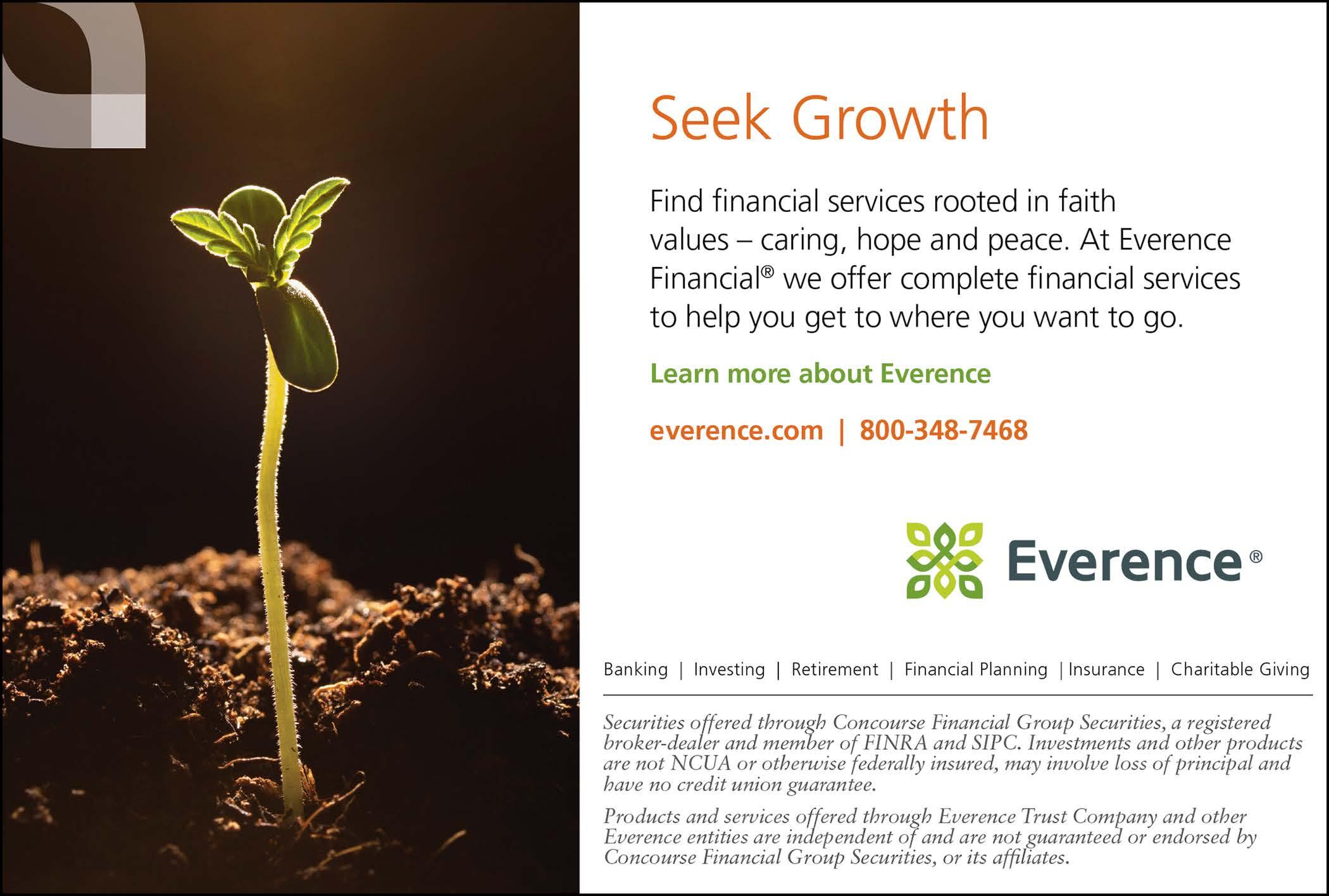
is less than completely enjoyable and fulfilling. It is important to distinguish between the unpleasant and frustrating parts of work, which is a result of the curse, and work itself, which is a part of the pre-Fall order.
I realize this was a quote which was included in the article and hopefully does not reflect the views of this publication. But since that quote was printed, it should have been addressed in an editor’s note. Again, hopefully, that was simply an oversight. (I know mistakes happen. Another result of the fall.)
I will include lines from two hymns by Isaac Watts, in which I find delightful portrayals of work in its un-fallen state.
“Let all the powers within
me join in work and worship so divine... My heart and soul in rapture join in work and worship so divine.” (“Bless, O My Soul, the Living God”)
“O may Thy house be my abode, and all my work be praise.” (“My Shepherd Will Supply My Need”)
I appreciate the reminders in The Marketplace that professing Christians should display the Lordship of Christ in the workplace and business world.
Sincerely,
James Swartz Harrisonburg, VA
15 The Marketplace September October 2023
Letter to the editor
Restoring the Dakin Dairy Farm after Hurricane Ian
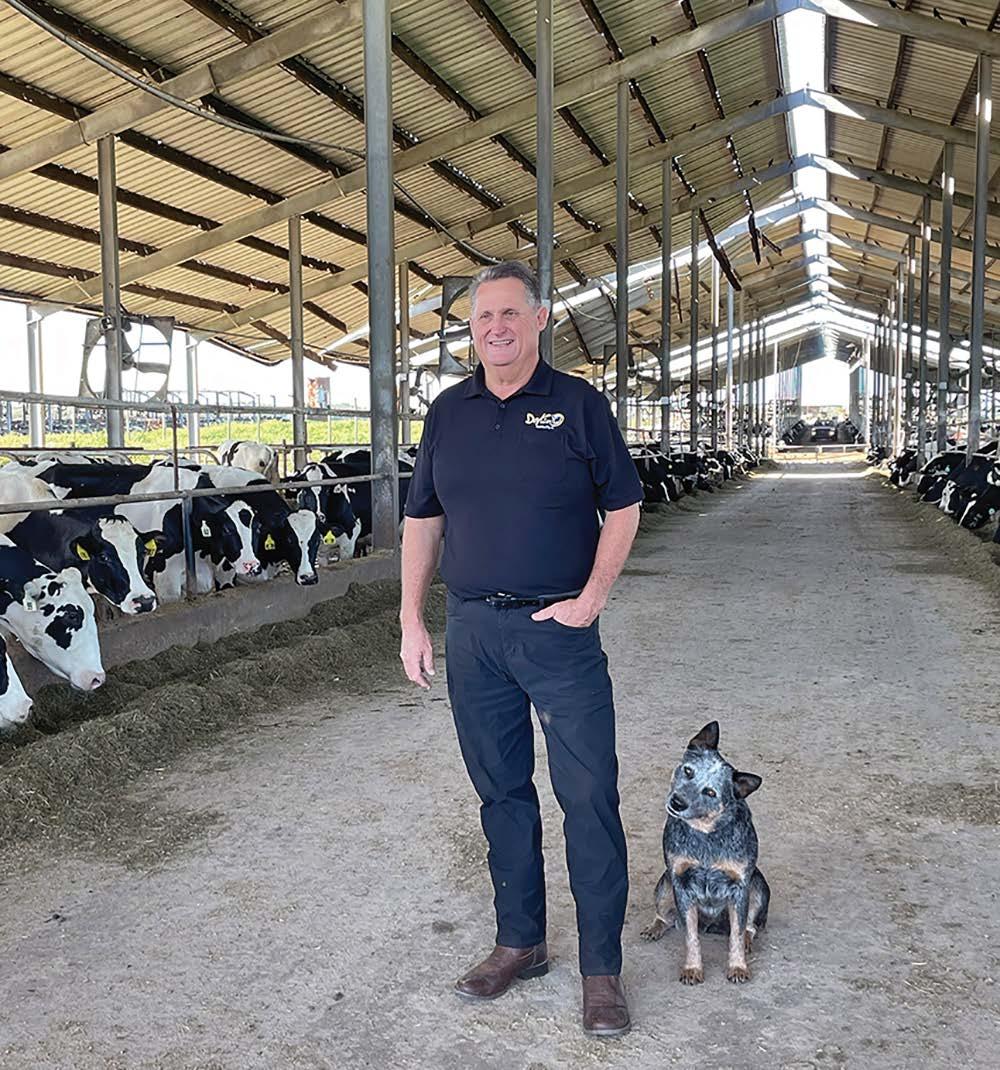
Florida farmer gets help to rebuild after devastating losses
By Karen Whiting
Myakka City, Florida — As Jerry Dakin drove home amid the increasing winds from Hurricane Ian, he passed several cows laying near a fence. At 3 a.m., he received a call from a neighbor that dead cows lay along the fence beside their adjoining property.
The veterinarian arrived soon after receiving a call. He gave several stunned cows molasses, glycol, and vitamins to wake them up and energize them, but more died. In total, he lost 360 cows, including calves. The shock from the storm killed the animals. Jerry’s brother, Cameron, lost about the same number of cows on his adjoining farm but sustained less property damage.
Hurricane Ian was the costliest hurricane in Florida’s history, with 155-mile-an-hour winds and flash flooding that brought up to 28 inches of rain in 27 hours in places and inflicted $109.5 billion in damage on the state in late September of 2022.
According to the University of Florida’s analysis, nearly five million acres of agricultural land were affected, with $1 billion in agriculture production losses.
In the past, the biggest loss for Jerry Dakin at
once was eight cows. Dakin said, “There’s always a time when you step away and there’s a cry moment. This is my livelihood. I’ve built every bit of this.”
Despite the damage, he was grateful that all his employees and their families were safe.
As he surveyed well over a million dollars of damages that included the loss of all six barn roofs and debris everywhere, his hardest struggle remained the question, “Am I hearing from God, and what is the vision?”
His greatest encouragement came from over 100 people who
showed up and started helping. He saw how God worked through others. He realized that when God pushes us, he walks us through hardships.
The Dakin farm has generators for milking and processing equipment but not for getting water to drink. They processed 15,000 gallons of milk daily and had to continue milking the cows three times a day while working on the damage.
Dakin moved the cows near the ponds and water sources but called on the community to bring in water, clothing, and food for workers who sustained damage to homes and possessions.
Help poured in quickly and also brought news of others in the community who needed help. Dakin turned the small café/store where they sold milk into a distribution center for people to drop off needed items, tools, and building supplies, or pick them up. Some people grabbed supplies and took them by canoe to give to people in flooded areas.
In addition to supplies, the Dakin farm gave out hot meals daily. One woman commented that it was her first hot meal in three days, and she greatly appreciated it.
16 The Marketplace September October 2023
Photos courtesy of Jerry Dakin
Jerry Dakin and his dog Brie in a restored dairy barn
The people who showed up gave Jerry Dakin a desire to jump in his truck and help others in the future.
After six days without power, a call to Tallahassee resulted in getting the power turned on. It only needed a minor repair. After the winter, as hotter days of spring approached, the roofs needed to be replaced to keep the cows cooler.
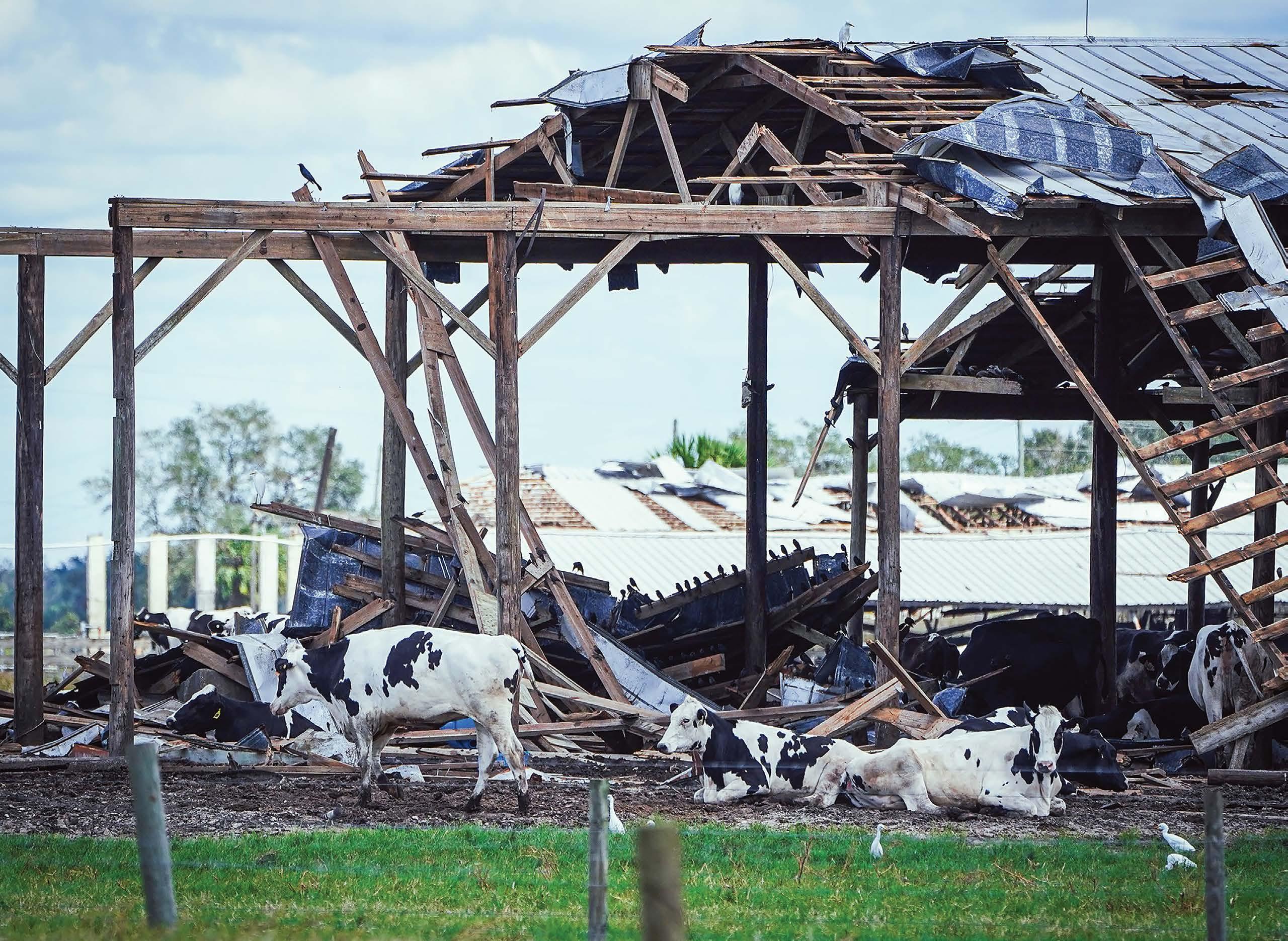
More unexpected help came, this time from a Mennonite farmer in Pennsylvania who Dakin did business with through the years. Willis Martin offered help with the roofs. At first, it seemed unbelievable. When Dakin realized the men were actually coming, he found housing for Martin and his 40 volunteers.
They arrived equipped with
tools and ready to work. In one week, the men and youth replaced barn roofs, repaired a shed, and helped with other repairs. Dakin said, “It’s amazing how God worked when we had a disaster.”
Dakin is milking 1,800 cows daily, still under the 2,200 he had before the hurricane. His next goal is to rebuild his stock. Some will come from breeding at the farm. Other cows he’ll need to buy. Insurance did not cover all the damage, and recovery is ongoing. After a recent fire in the hay shed, repairs are also needed there.
Dakin has realized there’s no need to worry about things that are not controllable but to leave those problems to God. “At the end of
the day, you’ll see that’s easy to say but tough to do,” he said.
Dakin said, “Everyone has different issues, but God is with us.”
Farm tours restarted in May. The café store re-opened, serving a limited menu, and selling milk products. Previously, more than 15,000 visitors came to the farm every year for tours, breakfast, lunch, or community events held on the property.
In addition to bottling his own milk, Dakin also produces buttermilk, cheese curds, and eggnog. He works with the Jewish community to supply kosher milk, since the dairy farm uses sustainable farming and produces natural milk.
17 The Marketplace September October 2023
Hurricane Ian caused more than $109.5 billion in damage in the state of Florida. Jerry Dakin’s dairy farm suffered a seven-figure loss of buildings and livestock.
That has meant having a mashgiach (Jewish supervisor) inspect the milking of the cows and processing of the milk, plus having prayers said over the cows. This gives them the rabbinical organization’s approval to use a kosher label.
The Dakin Farms have always helped in the community. They donate milk to scout groups, schools, and other organizations for special events. Jerry works with students involved in the Future Farmers of America, the 4H, and Reserve Officers’ Training Corps programs. In the spring, 80 students came over a four-day period to tour the farm and meet with Jerry.
In June, the Dakin farm held its first big event since the hurricane, Summer Days at Dakin Dairy. Local vendors sold food, candles, berries, and syrups. The event included live music, farm tours, a kiddy play area, and the farm’s dairy products.
The farm also resumed a calf cuddling event where children of all ages can cuddle with calves and
take photos. The tours, which end with free chocolate milk, share the sustainability methods used and ways the farm conserves water. The cows are grass-fed to produce better milk.
Dakin loves interacting with these young people, helping them love cows, and answering all their questions. Some of them come to
Pennsylvania Mennonites help Florida farmer rebuild
Willis Martin, a retired dairy farmer and member of the Meadow Spring Conference in Myerstown, Pennsylvania, knew Jerry Dakin from selling dairy cows to him through the years when he ran his own dairy farm. They had visited one another’s farms.
The daughter of one of Martin’s friends needed a new roof after damage caused by Hurricane Ian. They drove to Florida and helped her in the Fort Myers area. They saw much damage as they drove through that part of the state, and their hearts went out to the people.
When his conference started looking for a place to take the youth to help with Ian’s recovery, Martin contacted Dakin. When they set a date to arrive, Dakin ordered five semi-trucks of supplies for new barn roofs. Jerry called a retreat center, and the manager agreed to house
September 2023
them and let them use its kitchen.
The 40 volunteer workers included youth from four states. They arrived in March and spent a week putting up the roofs on all six barns and making other repairs. Many of the youth came from dairy farms, and Dakin’s operations impressed them.
Martin said, “We saw how much Jerry Dakin appreciated the help. That’s what moves our hearts to keep helping others.”
As Christians, Martin and his fellow church members follow God and want to serve others. They take great care in their work, “We put ourselves in their shoes and think of the place as if it were our own property.”
Martin knows that cows have trouble in the heat. He was glad they could bring comfort to the animals. His group looks forward to helping other people and animals in the future. .
work on projects or reports.
At the end of the school year, he gives leadership awards to selected graduating students. He keeps and enjoys thank-you cards children send him to show their appreciation for the tours.
Jerry Dakin worked in dairy farming since childhood on his dad’s farm in Parrish, Florida, and later bought it from his dad with his brother. In 2001 Jerry purchased his current farm in Myakka City and grew it to 2,200 milking cows.
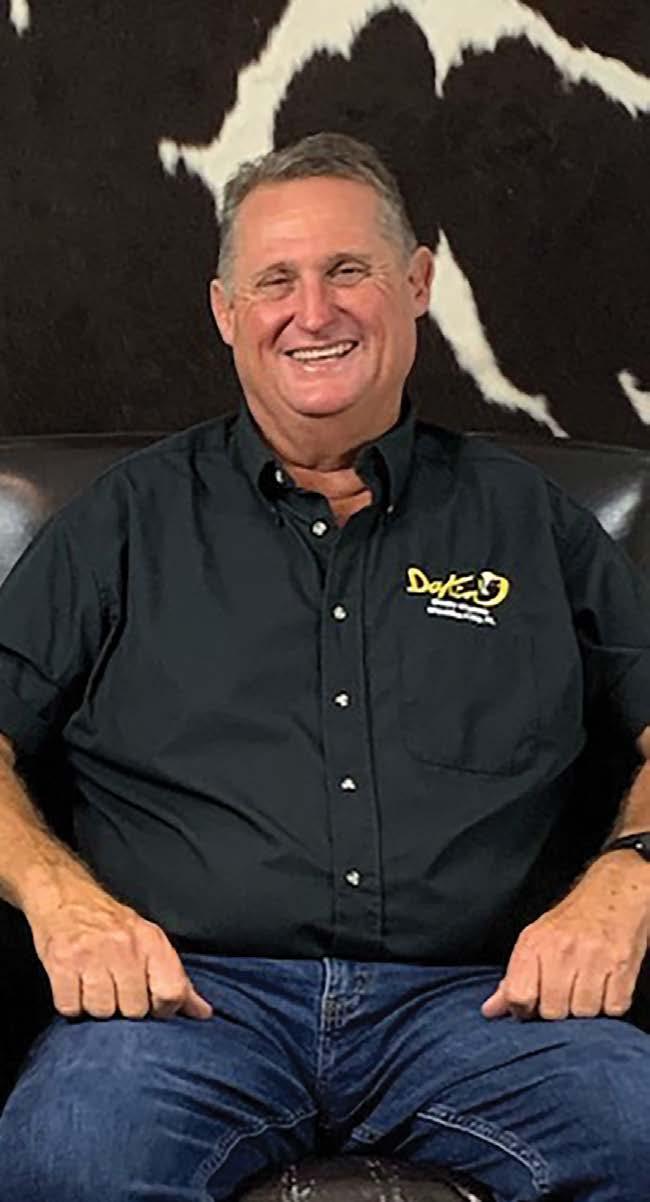
He was named the Florida Farmer of the year in 2022, chosen out of 43,000 farmers in the state. He also has served on the Manatee County Farm Bureau board since 2001 and joined the Manatee County Cattlemen’s Association in 2004. In 2021, he was inducted into the Manatee County Agriculture Hall of Fame.
The Dakin brothers’ farms are the last of two dairy farms in Manatee County, Florida.
Hurricane damage appeared overwhelming, especially after pandemic-related income losses that included dumping 7,000 gallons of milk daily at times due to supply chain issues. Those losses totaled 12 semi-trailer loads of milk. As Jerry Dakin said, “The cows didn’t stop producing milk when COVID-19 hit.”
In addition, supply issues caused problems. Some weeks there were no available bottles or bottle caps. At other times parts needed to repair trucks were hard to find.
Jerry Dakin drove milk and posted locations on Facebook where people could purchase his products. He developed new contacts during the pandemic with grocery chains in his region who remained customers after the supply crisis. Income from the side business of selling compost and dirt sustained the farm. .
18 The Marketplace September October 2023
Jerry Dakin
US billionaire women on the rise
The top 100 most successful businesswomen in America now oversee $124 billion, up almost 12 percent from 2022, Forbes magazine reports.
Building supplies queen Diane Hendricks tops the list, with a net worth of $15 billion.
Other notables include Lynda Resnick, ranked fourth on the list with a net worth of $5.3 billion. Resnick and her husband, Stewart, head the agricultural giant Wonderful Co. That firm grows and sells mandarin oranges, pistachios, almonds, pomegranates, and seedless lemons. Wonderful’s crops are grown on over 135,000 acres in California, Texas, and Nevada. Its $5 billion in annual sales make the Resnicks the US’s richest farmers. .
Play’s return on investment
September marks a return to overly busy routines for many.
Americans now work more hours than a 14th-century English peasant, a Newsweek magazine story suggests.
But science is increasingly showing that taking breaks for belly laughs and activities completely unrelated to work tasks can boost productivity and overall health.
Play reduces stress, improves group cohesion, and improves job satisfaction, innovation, and performance, the story suggests.
Research has shown that play helps people get into a state of mind known as flow, improving mood and energy while helping to alleviate anxiety. .
Tesla: your future electricity provider?
The company that sparked the electric vehicle industry is now setting its sights on energy storage.
In a Fortune magazine story
titled “Have We Reached Peak Tesla?, ” the writer discussed the company’s future focus.
Tesla’s energy storage business earned $3.9 billion in 2022. While that was just under five percent of total revenue, growth in its Megapack units is said to be “growing ridiculously fast.”
Each Megapack battery storage unit holds enough energy to power 3,600 homes. Tesla is ramping up production in a California factory and planning a new site in Shanghai to cut the two-year wait for these $1.9 million systems.
Tesla’s latest master plan describes the firm this way: “We make products that displace fossil fuels.” .
Buying bits of homes
Startup companies in the US are helping more people get into home ownership, but not in the way you might think.
Fractional investment companies allow people to invest in houses and apartment buildings by putting up as little as $100, Wired magazine reports.
Boosters say this approach lowers the barriers to investing in property. Others worry that the gains in this niche will come at the cost of low-income residents.
One of the larger players in this space, Fundrise, has more than 387,000 investors and $7 billion worth of apartments, single-family homes, and industrial properties. .
I spy leisurewear
Ever wonder what CIA agents do after they retire?
In the case of Emily Hikade, she turned a part-time side hustle into a multi-million-dollar pajama company, Inc. magazine reports.
The mother of four now heads
Petite Plume, a $10 million pjs producer.
Postings around the world helped her to find fabrics and factories in Europe and Asia. She launched the project in the US market in 2015, using Google ads and a Shopify site, while working in East Africa.
The most transferrable skill from the cloak-and-dagger world of counterterrorism to becoming an entrepreneur? Always be collecting intelligence and finding out what everyone else is doing. .
Fighting feathers, not fake meat
The US beef industry is falling further out of favor with consumers, Bloomberg Businessweek magazine suggests.
Beef’s chief rival for space on the dinner table isn’t vegetablebased products like Beyond Meat or Impossible burgers. It’s a fouler, fowl form of protein.
Chicken surpassed beef in perperson consumption 30 years ago. People in the US now eat about 100 pounds of chicken annually, twice as much as beef, which is three times more expensive. The consumption gap continues to widen.
But the beef industry continues to play an important role in that country’s agri-food sector.
U.S. cattle production includes upwards of 700,000 businesses, many of them family-owned, with a combined $85 billion in revenue. .
Comments
Would you like to comment on anything in this magazine, or on any other matters relating to business and faith? Send your thoughts to mstrathdee@meda.org
19 The Marketplace September October 2023 Soundbites
MEDA convention will celebrate 70 years of investing in entrepreneurs
Seventy years of investing in entrepreneurs is the theme of MEDA’s 2023 annual convention, which will be held at the Marriott Eaton’s Centre Downtown in Toronto, Ontario, from November 2-5.
Agnes Kalibata, a Rwandan agriculture scientist, policy maker, and president of the Alliance for a Green Revolution in Africa (AGRA), will be Saturday evening’s keynote speaker.
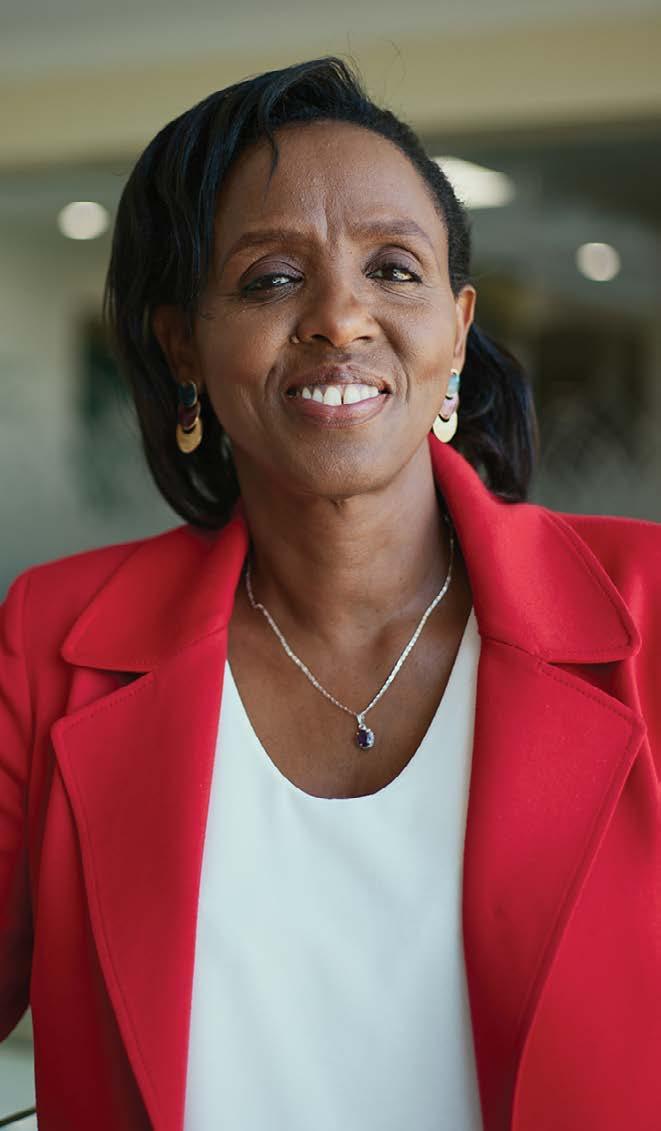
Kalibata has headed AGRA since 2014. The organization works to increase incomes and improve food security for farming households in 11 countries in Western and Eastern Africa. Prior to joining AGRA, she was Rwanda’s Minister of Agriculture and Animal Resources from 2008 to 2014, where she drove programs that moved her country to food security, helping to lift more than a million Rwandans out of poverty.
The convention will kick off Thursday evening with a panel of speakers reflecting on what MEDA has meant to them. Robert and Lisa Shuh will co-host the Thursday night panel.
On Friday morning, an institutional donor showcase will explore innovations in international development. This hybrid event will allow MEDA staff from around the world to attend.
Seminars include sessions on entrepreneurship in Paraguay, the MasterCard Foundation Africa Growth Fund, a panel of MEDA clients discussing how MEDA programs paved the way toward win-win partnerships, community economic development in North America, lessons learned along the way, business transitions from one
generation to the next and social impact investing.
A Friday noon panel will explore lasting impact through partnerships. Among the speakers:
• Verónica Herrera, who heads MiCrédito, a Central American financial institution that MEDA partly owns.
• MEDA board member Ferdinand Rempel will discuss CODIPSA, which produces commercial starch from manioc (cassava). CODIPSA, founded by businessmen who were members of MEDA Paraguay, grew to become the country’s largest starch producer.
MEDA’s annual business pitch competition is moving to Saturday morning this year. It will also be run in partnership and co-hosted
with and hosted by D-Prize, a San Francisco-based, non-profit 501 (c) (3) organization.
D-Prize’s strategy is to identify evidence-based poverty interventions, then provide seed capital grants to new business ventures in the Global South, allowing them to scale up their operations and impact their local contexts.
D-Prize runs challenges twice yearly, with 4,000 teams applying for seed capital.
Among the many sectoral challenges that it funds, several are agriculture-related, addressing such areas as quality inputs, postharvest support, and livestock interventions.
All of the finalists that will be competing in MEDA’s pitch competition in November will already have won a competition through D-Prize. Each of the proposed ventures will be geared toward advancing lasting, sustainable changes in rural agricultural communities in the Global South.
As always, the convention will allow for many opportunities to meet new friends and renew existing relationships. A preconvention tour on Thursday will visit businesses in St. Jacobs.
The convention will also include the always popular Friday night dine-around and several Saturday tours of Toronto attractions.
Cesar Garcia, general secretary of the Mennonite World Conference (MWC), will speak at Sunday morning’s closing session. MWC is an organization that serves 1.5 million members around the world in the Anabaptist tradition. .
20 The Marketplace September October 2023
Agnes Kalibata photo courtesy of AGRA
Saturday evening keynote speaker Agnes Kalibata, president of the Alliance for a Green Revolution in Africa (AGRA) is a former Rwandan agriculture minister.
Using solar power to displace costly diesel fuel
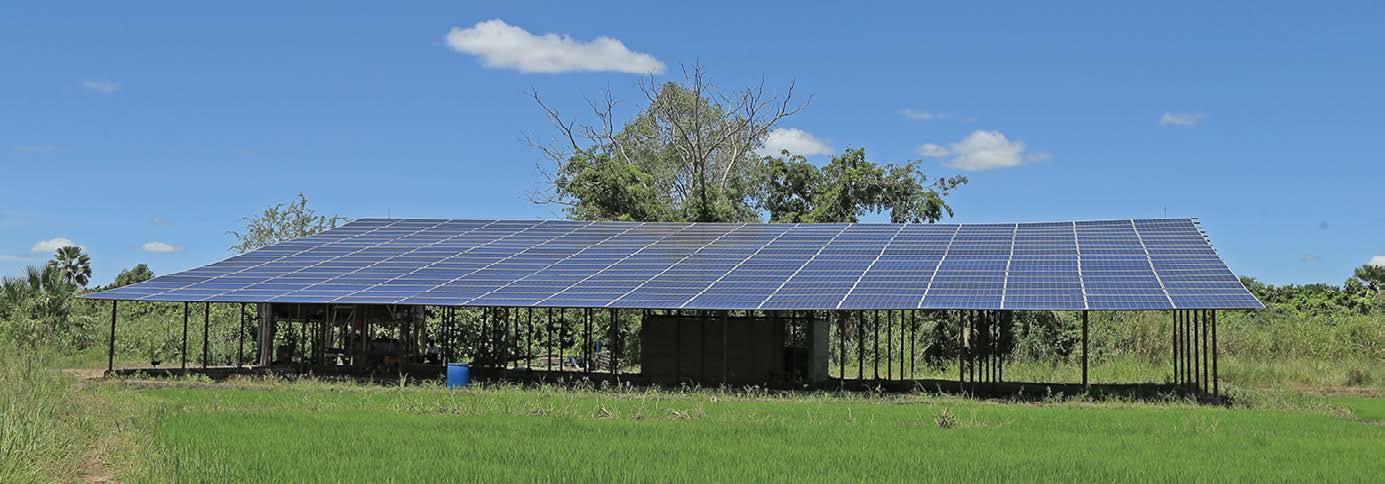
In a region where power costs are high, and supplies are sometimes unreliable, the use of solar panels makes financial and practical sense.
In Tamale, Ghana, the office for MEDA’s GROW2 (Greater Opportunities for Rural Women) project installed rooftop solar panels in November 2022.
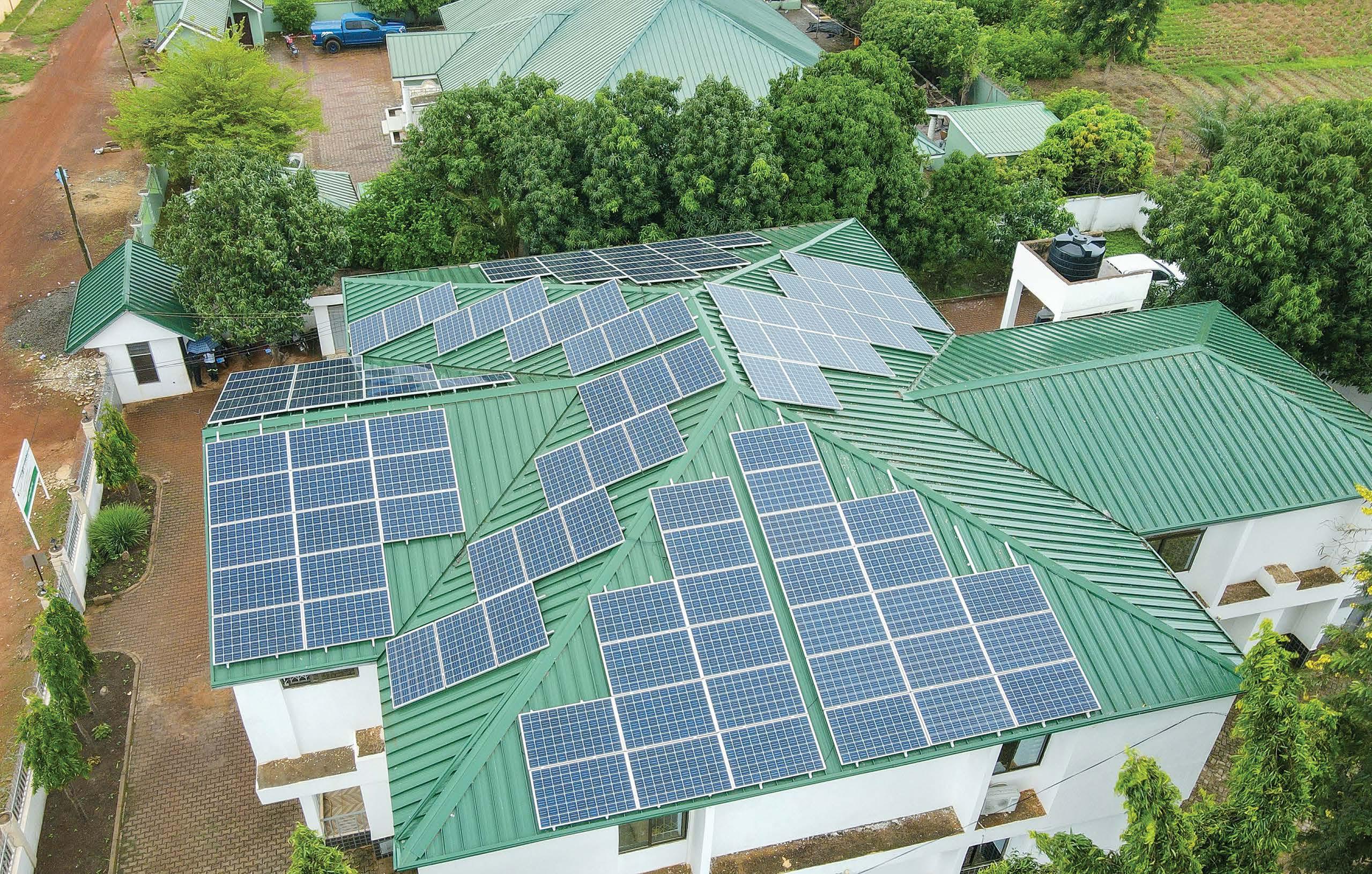
The office now receives 60 percent of its power from the sun on an average day. The installation will pay for itself within five years. Installation of the rooftop panels means the office saves a considerable amount of money
from not having to use a generator for backup power.
In Mamboleo, Tanzania, Mamboleo Farm Ltd., a lead firm working with MEDA, installed 272 solar panels to replace diesel power used for pumping water for irrigating rice.
The company, which has 160 acres of rice paddies, found that changing rainfall patterns allowed it to grow only one crop yearly. Since adopting a solar-powered irrigation system, it can get as much as 2.5 crops in a normal year, increasing productivity and revenue. .
21 The Marketplace September October 2023
MEDA's office in Tamale, Ghana now gets 60 percent of its power from rooftop solar panels.
Find What You Love and Change Your Life
Love + Work: How to Find What You Love, Love What You Do, and Do It for the Rest of Your Life by Marcus Buckingham (Harvard Business Review Press, 2022, 320 pages, $28.00 US)
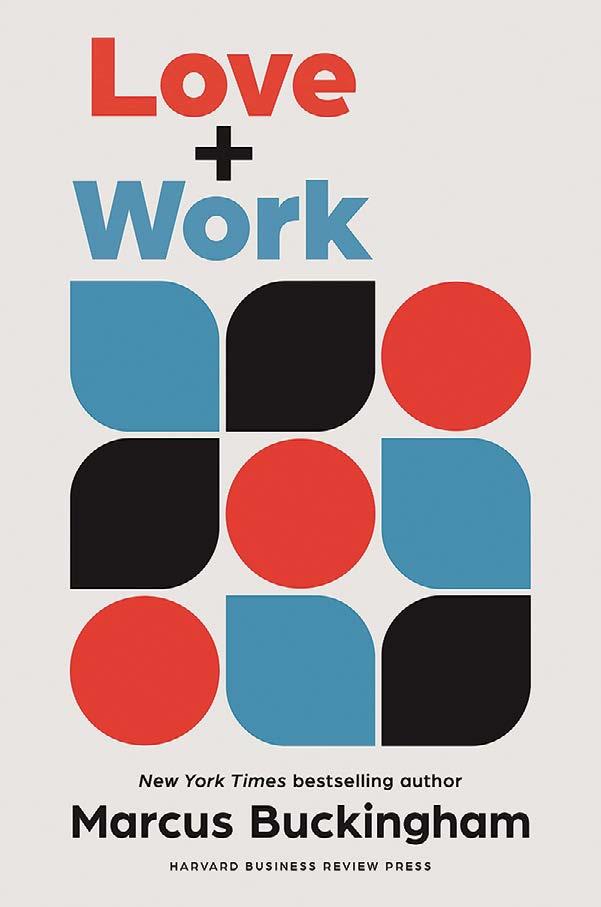
According to research by the Mayo Clinic, doctors and nurses who spent at least 20% of their work time on activities they loved experienced less burnout. In a global study of 25,000 workers by ADP Research Institute, those who did something they loved every day were “3.6 times more likely to be highly resilient.”
Author Marcus Buckingham is a lead researcher with ADP, and this kind of research undergirds his book. But the focus of Love + Work falls squarely on selfdiscovery, practical application, story-telling, and real-life examples. As he says in his introduction, “You are the project of this book.”
Part One of the project and of the book is finding what you love—not the goals others have for you, but your personal and unique loves. To get at this, a ten-question survey asks, among other things, “When was the last time someone had to tear you away from what you were doing? When was the last time you were the only person to notice something?”
Part Two outlines some of the challenges along the way, such as avoiding groupthink, learning to honor your fears, and dealing with the tendency to compare.
Part Three puts everything together to apply love + work to your career, being part of a team, parenting, the education system, and more. This book is engaging and helpful for those just starting out and for those looking to make some changes but aren’t sure why, what, or how. Love + Work is a good place to start. .
Disentangling and reconstructing faith
An Untidy Faith: Journeying Back to the Joy of Following Jesus by Kate Boyd (Herald Press 2023 240 pages, $18.99 US)

Kate Boyd is a graduate student at Perkins School of Theology. It is not surprising that she is going through a deconstruction of her earlier evangelical faith. It is part of graduate school to call everything into question.
She decides
early in her book to change the metaphor from deconstruction to disentangle. She wants to untangle four things that pertain to Israel and the Kingdom of God, the elites of this world and that the early church would overthrow Rome.
In her disentangling, she travels to various places including Latin America, East Africa, and Asia, and learns her evangelical upbringing could no longer provide the answers or even right questions.
She offers the reader personal stories and experiences that changed how she thought of her faith. Her tone is soft, clarifying and invitational, which is the opposite of many who are deconstructing their faith. I found this refreshing and hopeful.
In her conclusion, Boyd speaks of one of her favorite places in Istanbul, the great Hagia Sophia. It was once a church, then a mosque after the Ottoman Empire took over. Then in 1923, Kemal Ataturk made it into a museum.
Since she wrote An Untidy Faith, Hagia Sophia has changed back to a mosque under the present Turkish government, which proves her point that in our faith journey, we are always untangling our faith in God.
The space between Hagia Sophia and the Blue Mosque in Istanbul is a marvelous space to disentangle and reconstruct an untidy faith. .
Fred Redekop has been a pastor for 35 years He writes a daily blog for the church called PONDER ANEW.
22 The Marketplace September October 2023 Books in brief
April Yamasaki is an author, editor, and pastor.
Ideas from the coop
Chicken Scratch: Lessons on Living Creatively from a Flock of Hens
By Ann Byle (Broadleaf Books, 2023 213 pages, $22.99 US)

In Chicken Scratch, Ann Byle takes an eclectic look at life lessons learned from raising a small flock of hens, and how these notions apply to artistic pursuits.
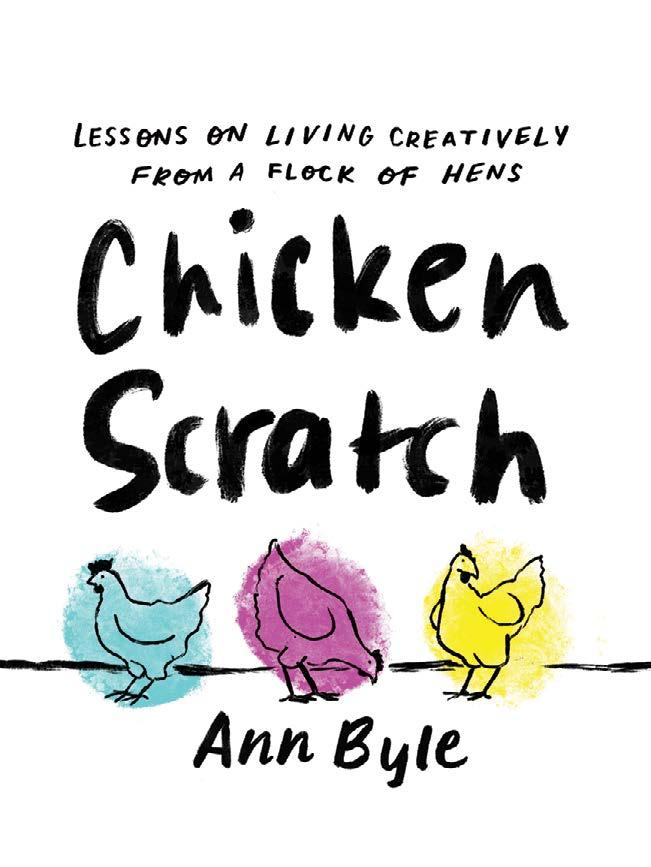
Like many of the millions of North Americans who have backyard coops, the Michigan resident names her birds and notes their personality quirks.
But she doesn’t romanticize the fowl, noting their bullying nature and nasty habit of pecking away at the weakest.
Her mix of information about chickens and ideas for creatives examines both daydreamers and the “left brain chickens” who focus
on action steps to get things done. Each chapter lists other relevant books and includes practical suggestions and information about topics that include writing, small business advice, cake decorating, guides to raising poultry, as well as faith and the creative life.
The book includes reflections on curiosity, perfectionism, selfdoubt, “flying the coop” or trying new things, surroundings that chickens and creatives alike need in order to thrive, and business considerations for raising chickens or pursuing creative endeavors.
Chicken Scratch is a wideranging, sometimes humorous compilation of quotes from many authors about poultry, thoughts on things to understand before buying chickens to raise, and important habits and activities to nurture the creative spirit.
“These adorable, exasperating, gentle, egg-laying miracles provide more than fresh food,” she writes. “They bring life to those who care for them and benefit from their eggs and meat. They bring joy to all who really see them for the creative, curious, courageous creatures they really are.” .
23 The Marketplace September October 2023 Books in brief



 Where Christian faith gets down to business
Where Christian faith gets down to business



































